Refrigeration Cycle
Understand the Intricacies of Heat Pump Refrigeration Cycle

Are you prepared to explore the intriguing realm of heat pump refrigeration cycles?
Strap in, because we’re about to take you on a journey through the intricate workings of these systems.
Just like a well-oiled machine, we’ll guide you through the evaporation process, the role of the compressor, and the condensation process.
We’ll also explore heat transfer and insulation, troubleshoot common issues, and show you how to maximize energy efficiency.
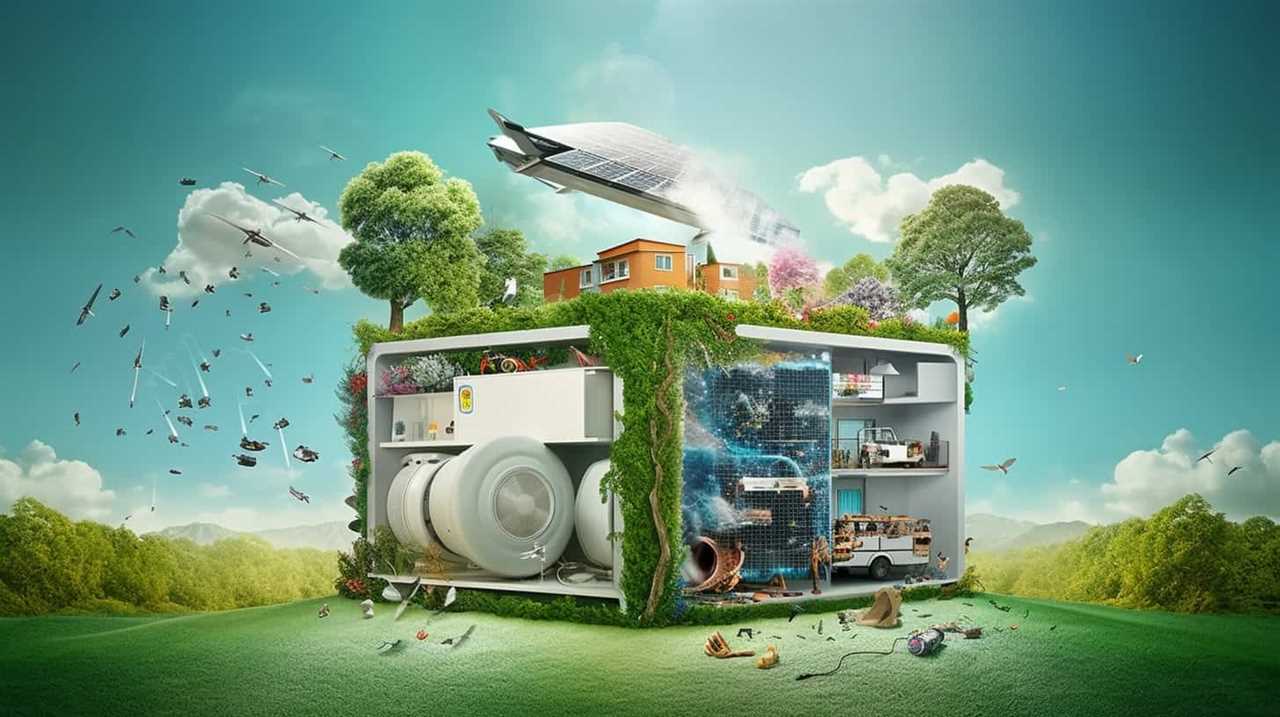
Get ready to become a heat pump expert!
Key Takeaways
- Heat pump technology offers advantages over traditional heating and cooling systems, and understanding its operation is essential to grasp the refrigeration cycle.
- The choice of refrigerants significantly affects the performance and efficiency of heat pump systems, and using environmentally friendly refrigerants is important for sustainability.
- The evaporation process and the role of the compressor are crucial in the refrigeration cycle, as they affect heat transfer and energy efficiency.
- Factors such as the choice of refrigerant, design of heat exchangers, and proper insulation levels and installation all play a role in maximizing heat transfer efficiency and reducing energy losses.
The Basics of Heat Pump Operation
We need to understand the basics of how a heat pump operates in order to grasp the intricacies of its refrigeration cycle.
Heat pump technology offers several advantages over traditional heating and cooling systems, making it an attractive option for many homeowners.
The installation of a heat pump involves a few key steps. First, the outdoor unit is positioned in a suitable location outside the home. Then, refrigerant lines are connected to the indoor unit, which is usually installed in a utility room or basement. The indoor unit is responsible for distributing heated or cooled air throughout the home.
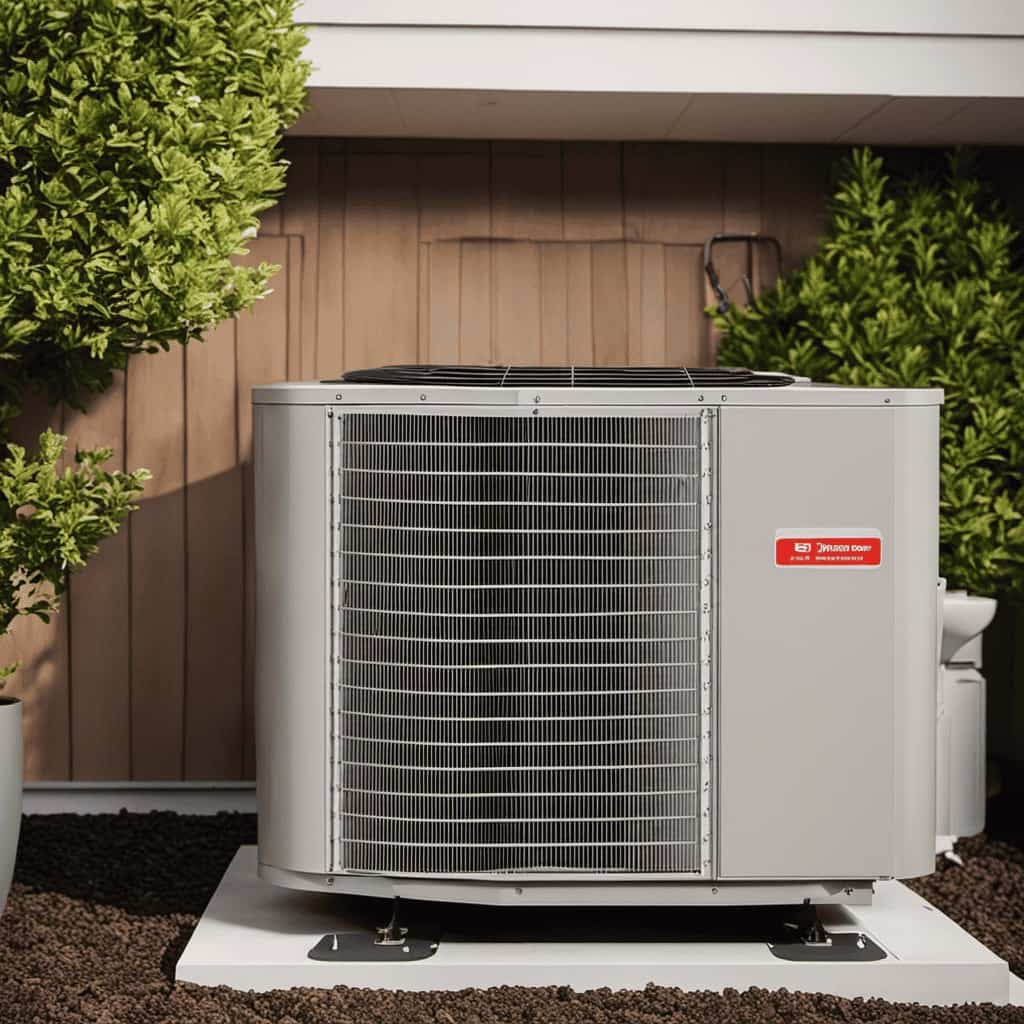
By utilizing the principles of refrigeration, a heat pump can efficiently transfer heat from one area to another, providing both warmth in the winter and coolness in the summer.
Understanding the basics of heat pump operation is essential as we delve further into the role of refrigerants in heat pump systems.
Understanding the Role of Refrigerants in Heat Pump Systems
Refrigerants play a crucial role in the operation of heat pump systems, impacting both their efficiency and environmental impact. It’s important to consider the specific properties of the refrigerants used, such as their thermodynamic characteristics and global warming potential, when designing and operating heat pump systems.
Environmental considerations, such as the phase-out of certain refrigerants due to their ozone depletion potential, also need to be taken into account in order to ensure the sustainability of heat pump technology.

Impact of Refrigerants
As we delve into the intricacies of the heat pump refrigeration cycle, it becomes evident that the choice of refrigerants plays a crucial role in the overall performance and efficiency of the system. The impact of refrigerants can be significant, both in terms of environmental impact and system efficiency. Here are three key points to consider:
-
Refrigerant types: There are various types of refrigerants available, each with its own unique properties and environmental impact. Common refrigerant types include hydrofluorocarbons (HFCs), hydrochlorofluorocarbons (HCFCs), and natural refrigerants such as ammonia and carbon dioxide. Choosing the right refrigerant involves considering factors such as efficiency, safety, and environmental regulations.
-
Environmental regulations: With increasing concerns about climate change and ozone depletion, there are stringent regulations in place to control the use of refrigerants. Many countries have phased out or are in the process of phasing out high-global warming potential (GWP) refrigerants in favor of lower-GWP alternatives. It’s important to stay updated with these regulations to ensure compliance and minimize environmental impact.
-
System efficiency: The choice of refrigerant can greatly impact the efficiency of a heat pump system. Refrigerants with higher heat transfer coefficients and lower pressure drops can enhance the overall performance of the system. Additionally, factors such as refrigerant charge, system design, and maintenance practices can also influence system efficiency.
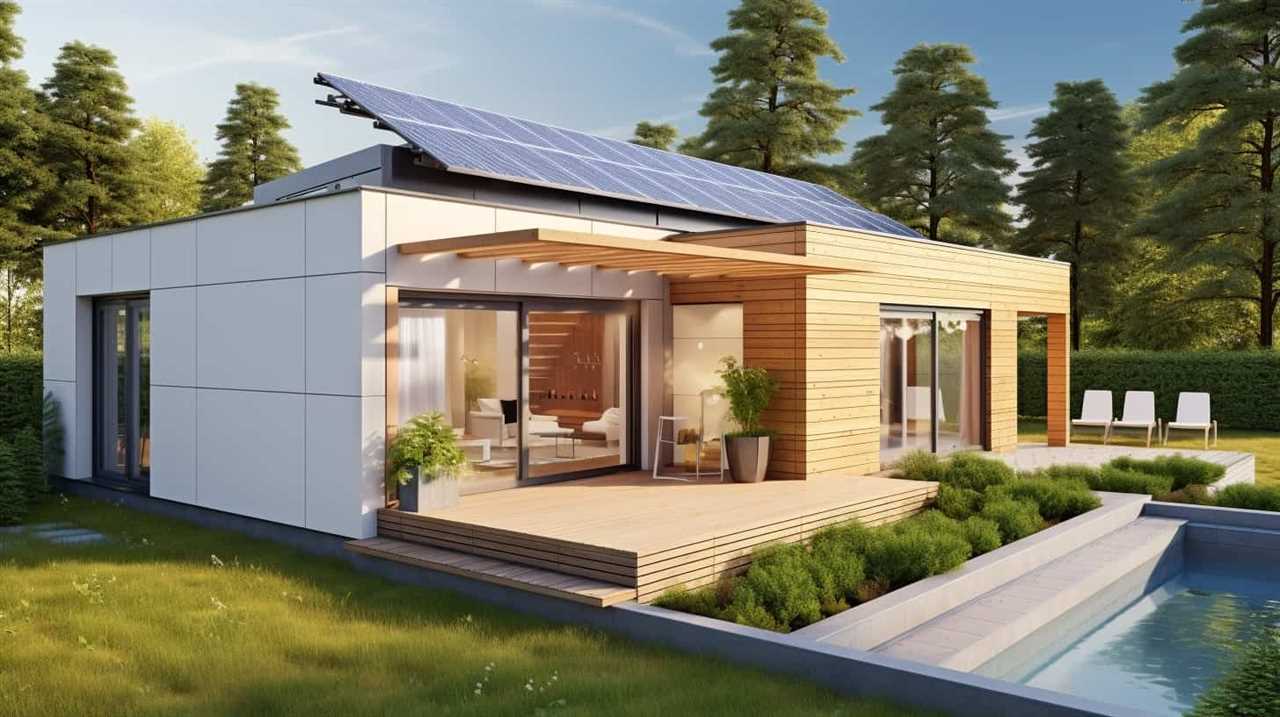
Understanding the impact of refrigerants is crucial for optimizing the performance and efficiency of heat pump systems while complying with environmental regulations. By making informed choices and adopting best practices, we can serve our audience by providing sustainable and efficient heating and cooling solutions.
Environmental Considerations
For optimal environmental considerations, it’s important to understand the role of refrigerants in heat pump systems and the impact they have on sustainability and efficiency.
Refrigerants play a crucial role in the heat pump cycle as they facilitate the transfer of heat from one location to another. However, certain refrigerants have been found to have detrimental effects on the environment, such as contributing to global warming and depleting the ozone layer.
To address these concerns, there has been a shift towards using refrigerants that have a lower global warming potential and zero ozone depletion potential. This shift towards more environmentally friendly refrigerants not only helps in reducing emissions but also promotes sustainable practices.

The Evaporation Process in a Heat Pump Refrigeration Cycle
We actively participate in the evaporation process within a heat pump refrigeration cycle. Evaporation is a crucial step in the cycle, where the refrigerant, in a low-pressure state, absorbs heat from the surrounding environment and undergoes a phase change from a liquid to a vapor.
This process occurs in the evaporator coil, where the refrigerant enters as a low-temperature liquid and exits as a low-temperature vapor. The evaporation efficiency is determined by factors such as the temperature difference between the refrigerant and the surrounding environment, the surface area of the evaporator coil, and the evaporation rate.
It’s important to optimize the evaporation process to maximize the heat transfer and improve the overall efficiency of the heat pump system. As we move on to discuss the role of the compressor in heat pump operation, it’s essential to understand the significance of the evaporation process in the refrigeration cycle.
The Role of the Compressor in Heat Pump Operation
The compressor plays a crucial role in the operation of a heat pump. Its main function is to compress the refrigerant, raising its temperature and pressure. This is essential for the refrigerant to release heat during the condensation process.
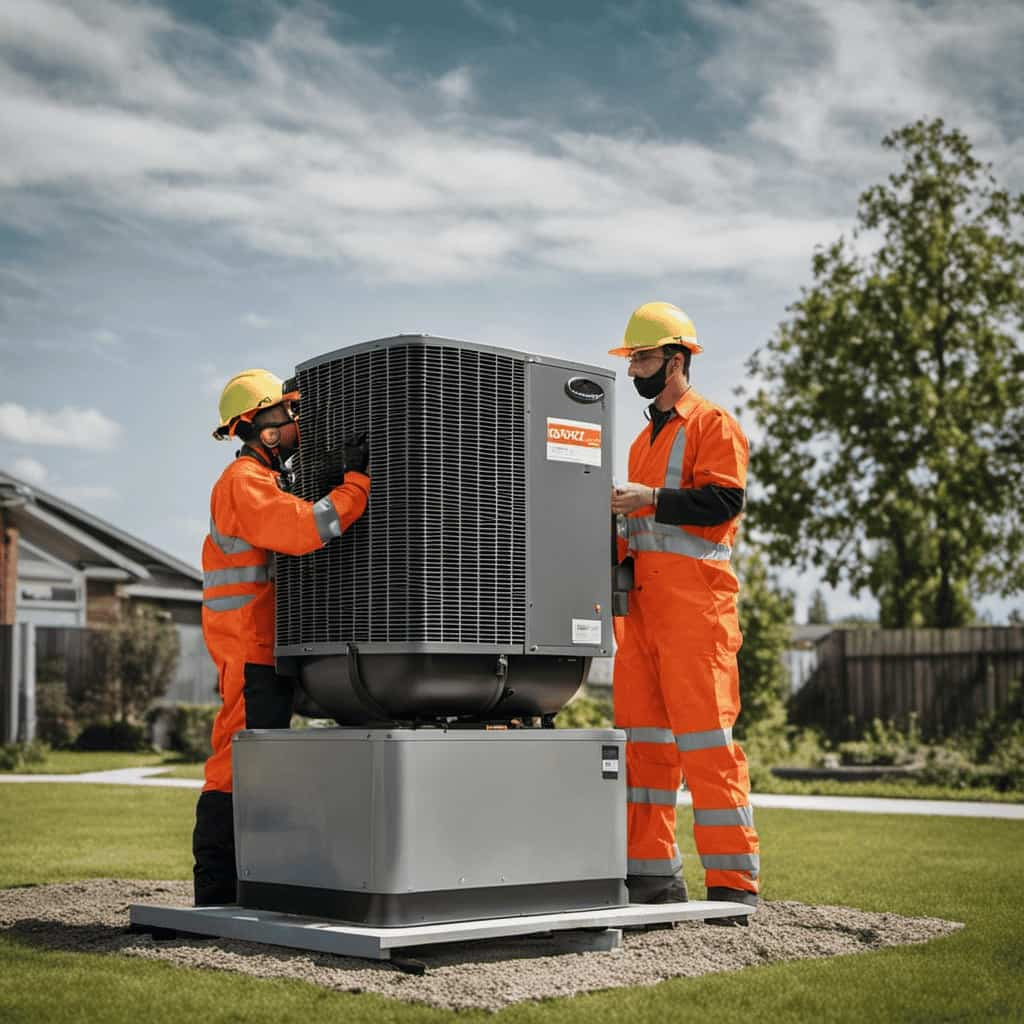
The efficiency of the compressor is of utmost importance, as it directly affects the overall performance and energy consumption of the heat pump system.
Regular maintenance and proper care of the compressor are necessary to ensure its optimal functioning and longevity.
Compressor’s Function and Design
To fully grasp the inner workings of a heat pump, it’s essential to understand the role and design of the compressor, which plays a crucial part in the operation of the system. The compressor is responsible for pressurizing the refrigerant, increasing its temperature and pressure to facilitate heat transfer.
Here are three key aspects to consider when discussing the function and design of the compressor:

-
Compressor Efficiency: The efficiency of the compressor is vital for the overall performance of the heat pump. Higher efficiency means lower energy consumption and reduced operating costs. Regular maintenance, such as cleaning or replacing air filters, lubricating moving parts, and checking refrigerant levels, can help optimize the compressor’s efficiency.
-
Compressor Maintenance: Proper maintenance is essential to ensure the compressor’s longevity and reliability. Regular inspections, cleaning, and servicing can help identify and address potential issues before they escalate. This includes checking for leaks, monitoring refrigerant levels, and ensuring proper airflow.
-
Compressor Design: Compressor design varies depending on the specific heat pump system. Factors such as size, capacity, and type of refrigerant impact the design choices. It’s crucial to select a compressor that matches the system requirements to ensure optimal performance and efficiency.
Understanding the function and design of the compressor is crucial for maintaining the efficiency and performance of a heat pump system. Regular maintenance and selecting the right compressor design can contribute to a reliable and energy-efficient operation.

Importance of Compressor Efficiency
Maintaining high compressor efficiency is crucial for optimizing the performance of a heat pump system. The compressor plays a vital role in the heat pump operation by compressing the refrigerant gas, raising its temperature and pressure, and facilitating heat transfer.
However, over time, the compressor may experience wear and tear, which can lead to reduced efficiency and performance. Regular compressor maintenance is essential to prevent these issues and ensure optimal operation.
Energy-saving techniques, such as keeping the compressor clean and free from debris, ensuring proper lubrication, and monitoring refrigerant levels, can help improve compressor efficiency. Additionally, regular inspections, timely repairs, and replacing worn-out parts can also contribute to maintaining high compressor efficiency.
Compressor Maintenance Tips
Our top compressor maintenance tip is regularly cleaning and inspecting the compressor to ensure optimal heat pump operation. Here are three key compressor maintenance techniques that can help troubleshoot compressor issues:

-
Check for refrigerant leaks: Inspect the compressor for any signs of refrigerant leakage such as oil stains or hissing sounds. Leaks can lead to reduced cooling capacity and inefficient operation.
-
Clean the condenser coil: Dust and debris can accumulate on the condenser coil, reducing heat transfer and causing the compressor to work harder. Regularly clean the coil using a soft brush or compressed air to maintain efficient heat exchange.
-
Lubricate moving parts: The compressor contains various moving parts that require lubrication to reduce friction and prevent wear. Check the manufacturer’s guidelines for the recommended lubrication schedule and use the appropriate lubricant.
By following these compressor maintenance techniques, you can ensure the longevity and efficiency of your heat pump system.
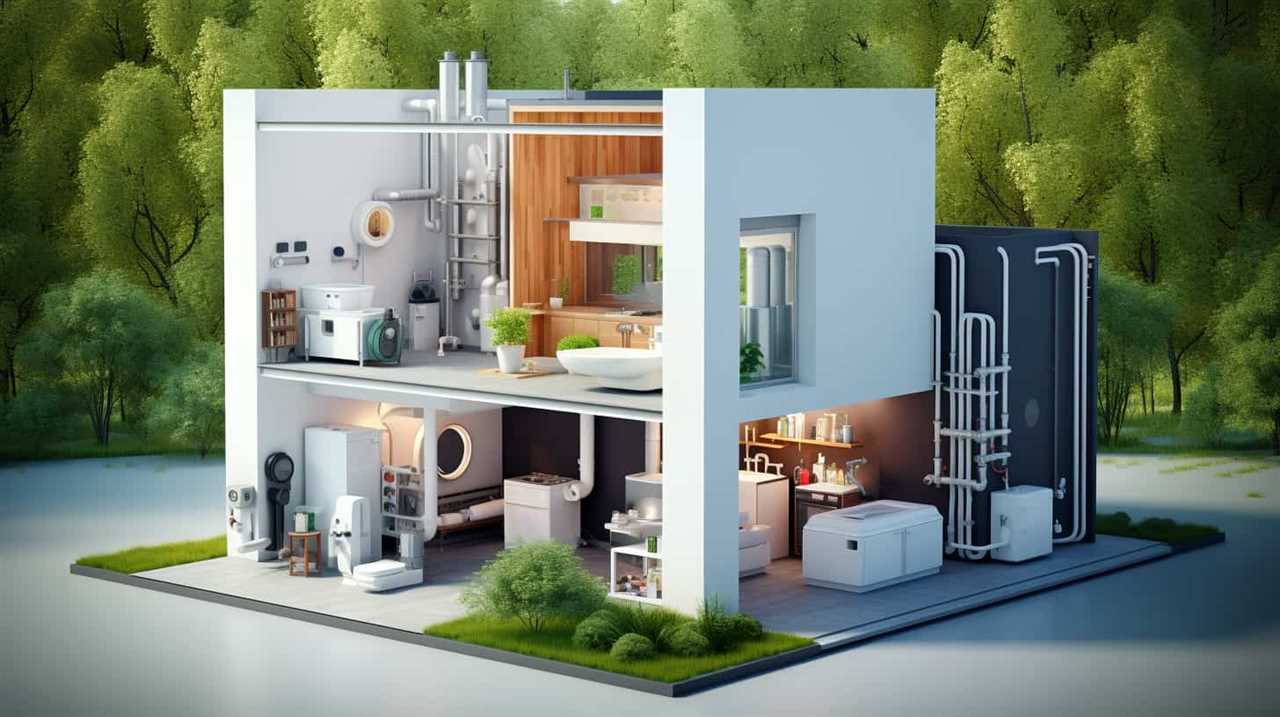
Now, let’s move on to discussing the condensation process in a heat pump refrigeration cycle.
The Condensation Process in a Heat Pump Refrigeration Cycle
During the condensation process in a heat pump refrigeration cycle, we extract heat from the refrigerant gas as it transitions to a liquid state. This is a crucial step in the refrigeration cycle as it allows the heat pump to transfer heat from a lower temperature source to a higher temperature sink. To better understand the condensation process, let’s take a look at the following table:
| Stage | Description | Purpose |
|---|---|---|
| 1 | High-pressure, high-temperature refrigerant gas enters the condenser. | To release heat and cool the gas. |
| 2 | The refrigerant gas cools and condenses into a high-pressure liquid. | To remove heat from the gas and prepare it for the expansion process. |
| 3 | Heat is transferred to the surroundings as the refrigerant releases heat energy. | To maintain a temperature difference between the refrigerant and the surroundings. |
| 4 | The refrigerant exits the condenser as a high-pressure liquid. | To continue to the next stage of the refrigeration cycle. |
Exploring the Expansion Valve in Heat Pump Systems
Let’s explore how the expansion valve works in heat pump systems. The expansion valve is a critical component in the refrigeration cycle that controls the flow of refrigerant. Its primary function is to reduce the pressure of the refrigerant as it enters the evaporator.
Here are three key points to understand about the expansion valve:
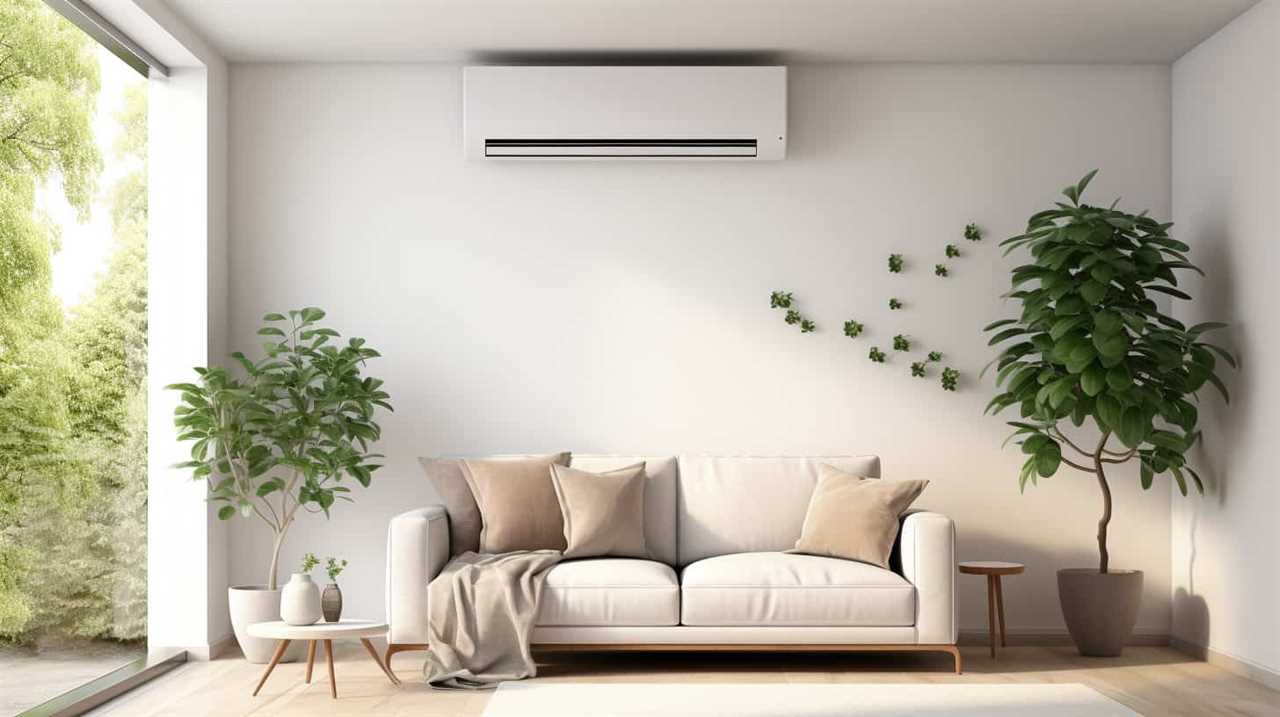
-
Expansion Valve Function: The expansion valve acts as a metering device that regulates the flow of refrigerant from the high-pressure side to the low-pressure side of the system. It ensures that the refrigerant enters the evaporator at the right pressure and temperature for efficient heat transfer.
-
Expansion Valve Efficiency: The efficiency of the expansion valve is crucial for optimal system performance. It must be able to accurately control the flow of refrigerant and maintain the desired pressure drop across the valve. This helps to maximize the heat transfer capacity of the evaporator and improve overall system efficiency.
-
Importance of Proper Sizing: The expansion valve needs to be properly sized for the specific heat pump system. If the valve is too small, it can restrict the flow of refrigerant and cause inefficiencies. On the other hand, if the valve is too large, it can lead to poor temperature control and reduced system performance.
Understanding the function and efficiency of the expansion valve is essential for ensuring the proper operation of a heat pump system. Now, let’s transition into the subsequent section about heat transfer in a heat pump refrigeration cycle.
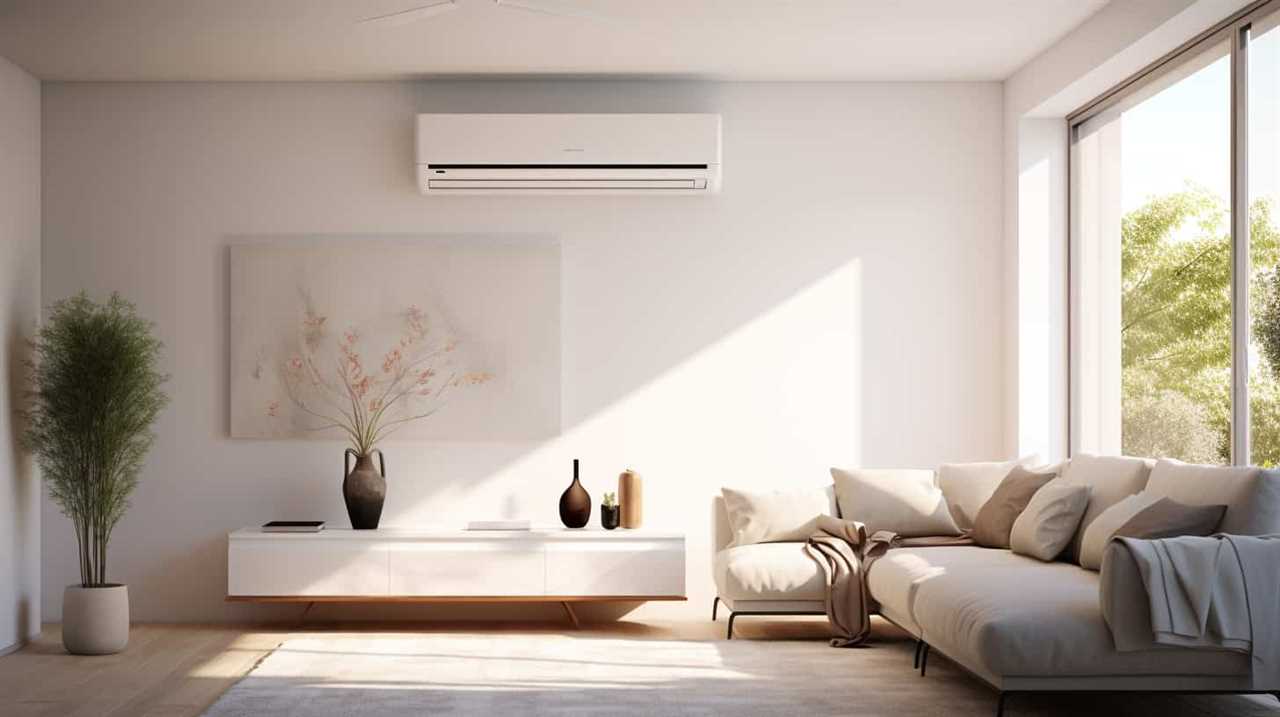
Heat Transfer in a Heat Pump Refrigeration Cycle
Heat transfer occurs within a heat pump refrigeration cycle as the refrigerant absorbs and releases heat during its journey through the system. The efficiency of heat transfer is a crucial consideration in heat pump design.
To achieve optimal heat transfer efficiency, several factors must be taken into account. One such factor is the choice of refrigerant, as different refrigerants have varying heat transfer properties.
Additionally, the design of heat exchangers plays a vital role in facilitating efficient heat transfer. Proper sizing and placement of heat exchangers ensure maximum contact between the refrigerant and the medium being heated or cooled.
Furthermore, the flow rate of the refrigerant must be carefully controlled to maintain efficient heat transfer. By addressing these heat pump design considerations, we can enhance the heat transfer efficiency of the system.
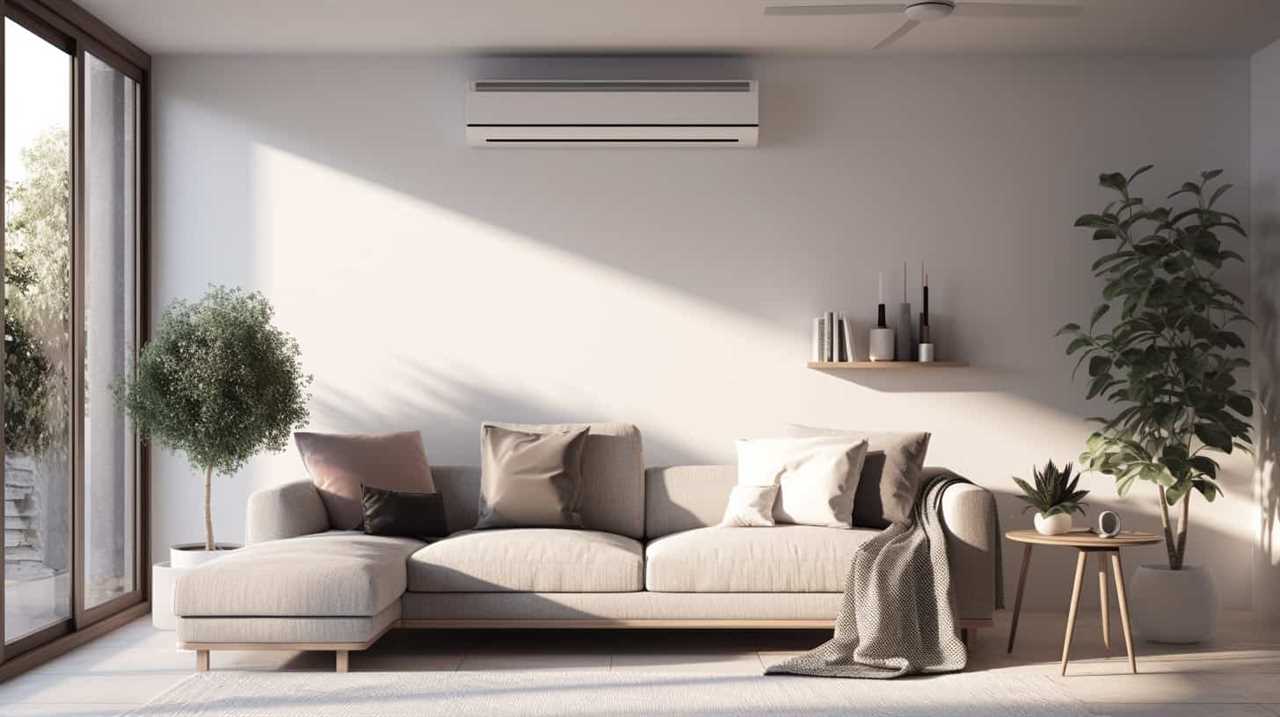
This leads us to the next topic: the importance of proper insulation in heat pump efficiency.
The Importance of Proper Insulation in Heat Pump Efficiency
Proper insulation plays a crucial role in maximizing heat pump efficiency. By minimizing heat transfer, insulation helps to reduce energy losses and improve overall system performance.
Ensuring optimal insulation levels is essential for achieving energy savings and maintaining the desired temperature in a heat pump system.
Insulation and Energy Savings
Our insulation plays a crucial role in maximizing our heat pump’s efficiency and energy savings. Proper insulation is essential for maintaining optimal temperature levels inside our homes, reducing heat loss or gain, and ultimately saving energy. Here are three key factors to consider when it comes to insulation and energy savings:
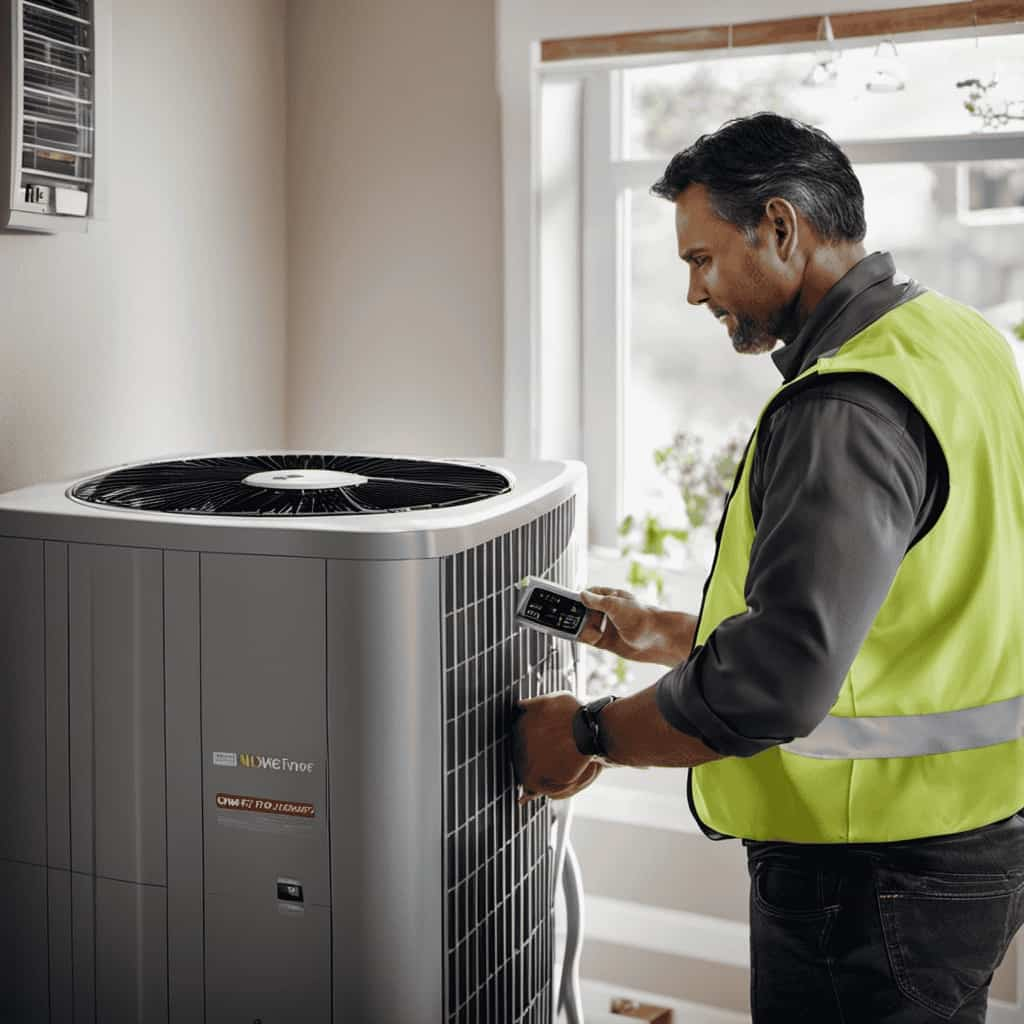
-
Insulation Benefits:
Insulation acts as a barrier, preventing the transfer of heat between the inside and outside of our homes. By reducing heat loss during colder months and heat gain during warmer months, insulation helps to maintain a comfortable indoor environment without over-reliance on our heat pump system. This leads to significant energy savings and lower utility bills. -
Insulation Types:
There are various insulation types available, including fiberglass, cellulose, spray foam, and rigid foam. Each type has its own thermal resistance properties, installation requirements, and cost considerations. Choosing the right insulation type for our specific needs is crucial to ensure maximum energy efficiency. -
Proper Installation:
Proper installation of insulation is critical for its effectiveness. Gaps, leaks, or inadequate coverage can compromise the insulation’s performance and lead to energy loss. It’s essential to hire a professional to ensure proper installation, as they’ve the knowledge and expertise to achieve optimal results.
Impact on Heat Transfer
With the right insulation, we can significantly improve the efficiency of our heat pump by minimizing heat transfer. Heat transfer is the movement of thermal energy from one object to another, and in the case of a heat pump, it can have a significant impact on its performance.

Proper insulation helps to prevent heat loss or gain during the refrigeration cycle, ensuring that the heat pump operates at its optimal efficiency. Insulation acts as a barrier, reducing the transfer of heat between the indoor and outdoor environments. This means that less energy is required to heat or cool the space, resulting in improved heat pump efficiency and performance.
By investing in high-quality insulation materials and ensuring proper installation, we can maximize the benefits of our heat pump and achieve greater energy savings.
In the next section, we’ll explore additional factors that are crucial in ensuring optimal performance of our heat pump.
Ensuring Optimal Performance
To achieve optimal performance, we must ensure that proper insulation is in place and that heat transfer is minimized in our heat pump refrigeration cycle. Improving performance and optimizing efficiency are crucial in order to provide the best service to our customers.
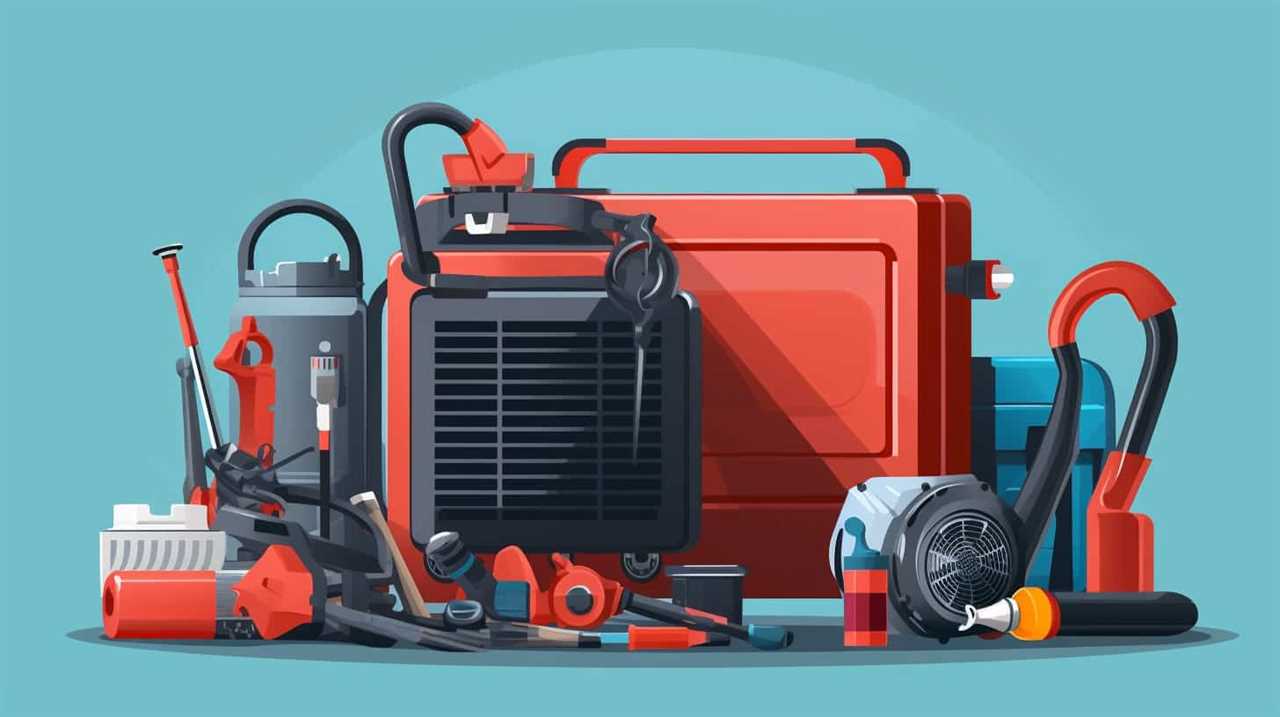
Here are three key factors to consider when it comes to insulation:
-
Insulation material: Choosing the right insulation material is essential for reducing heat transfer. Materials such as fiberglass, foam board, and cellulose insulation offer excellent thermal resistance, helping to maintain the desired temperature inside the system.
-
Insulation thickness: The thickness of the insulation also plays a significant role in minimizing heat transfer. Thicker insulation provides better resistance to heat flow, resulting in improved energy efficiency.
-
Proper installation: Ensuring proper installation of the insulation is vital to avoid any gaps or air leaks. Any gaps can lead to heat loss or gain, which negatively impacts the overall efficiency of the heat pump system.
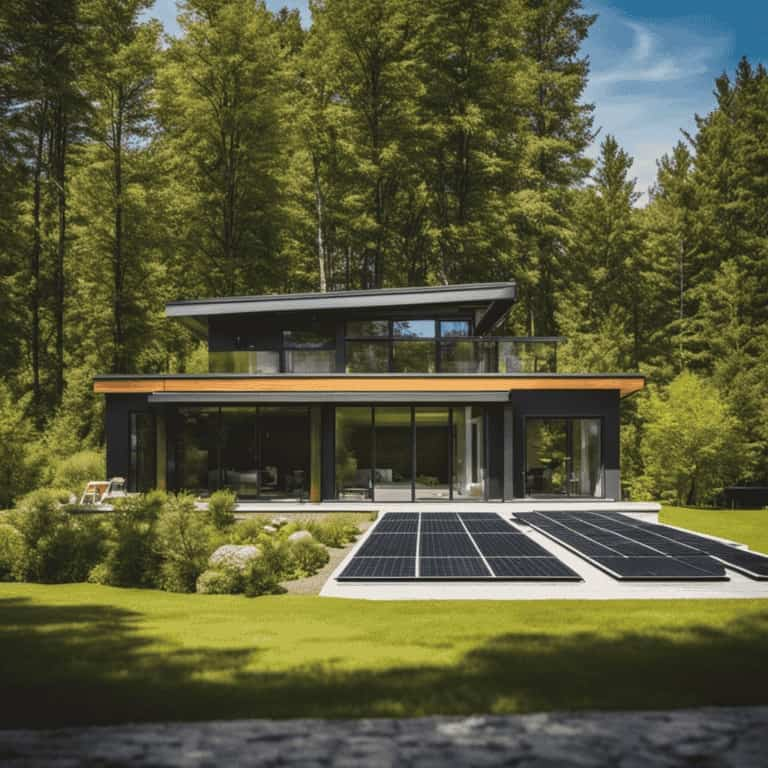
By implementing these insulation measures, we can enhance the performance and efficiency of our heat pump refrigeration cycle.
Now, let’s delve into troubleshooting common issues in heat pump refrigeration cycles.
Troubleshooting Common Issues in Heat Pump Refrigeration Cycles
We can identify and resolve common issues in heat pump refrigeration cycles by following a systematic troubleshooting process. When troubleshooting heat pump refrigeration cycles, it’s essential to have a good understanding of the system’s components and how they interact with each other.
Some common malfunctions in heat pump refrigeration cycles include inadequate heating or cooling, low airflow, refrigerant leaks, and electrical problems. To diagnose these issues, it’s important to use troubleshooting techniques such as checking for error codes, inspecting electrical connections, measuring temperatures and pressures, and examining airflow.
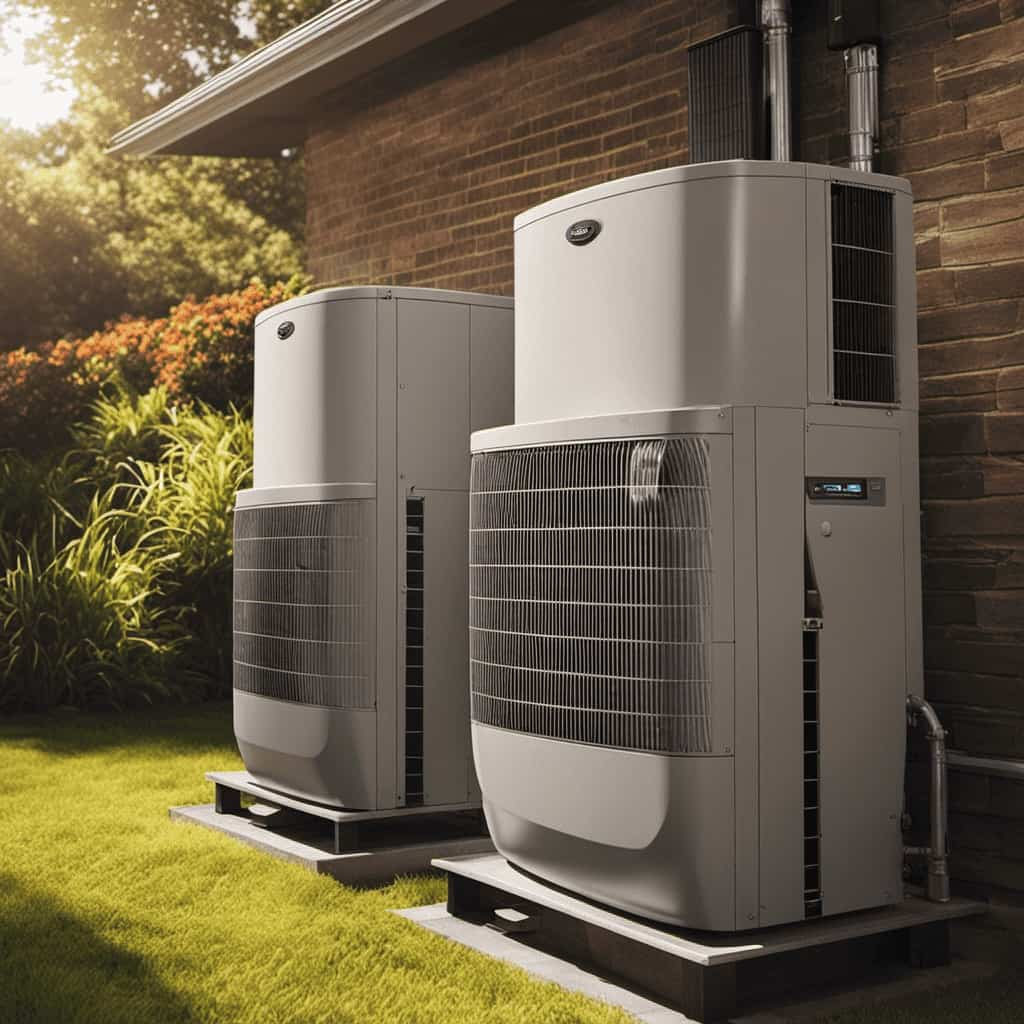
Once the problem is identified, it can be resolved by repairing or replacing faulty components, recharging refrigerant if needed, or adjusting settings. By effectively troubleshooting these common issues, we can ensure that heat pump refrigeration cycles operate optimally and efficiently.
Transitioning into the subsequent section about maximizing energy efficiency in heat pump operation, let’s explore some strategies to minimize energy consumption while maintaining comfort.
Maximizing Energy Efficiency in Heat Pump Operation
To optimize energy efficiency in heat pump operation, we can implement various strategies that enhance the system’s performance and minimize energy consumption.
Here are three effective ways to maximize energy savings and improve heat pump performance:

-
Regular maintenance: Conducting routine maintenance is crucial for ensuring the optimal functioning of a heat pump. This includes cleaning or replacing filters, inspecting coils and connections, and lubricating moving parts. Regular maintenance helps to prevent energy waste and extends the lifespan of the heat pump.
-
Proper insulation: Ensuring that your home is well-insulated can significantly reduce heat loss and gain, allowing the heat pump to operate more efficiently. Insulating walls, ceilings, and floors, as well as sealing air leaks, helps to maintain a consistent indoor temperature and reduces the workload on the heat pump.
-
Thermostat management: Adjusting the thermostat settings can have a significant impact on energy consumption. Lowering the temperature in winter and raising it in summer by a few degrees can lead to substantial energy savings. Additionally, using programmable thermostats allows for customized temperature schedules, optimizing comfort and efficiency.
Frequently Asked Questions
Can a Heat Pump Be Used to Cool a Space as Well as Heat It?
Yes, a heat pump can be used to cool a space in addition to heating it. This is achieved by reversing the refrigeration cycle. The efficiency and lifespan of a heat pump depend on regular maintenance and proper installation.
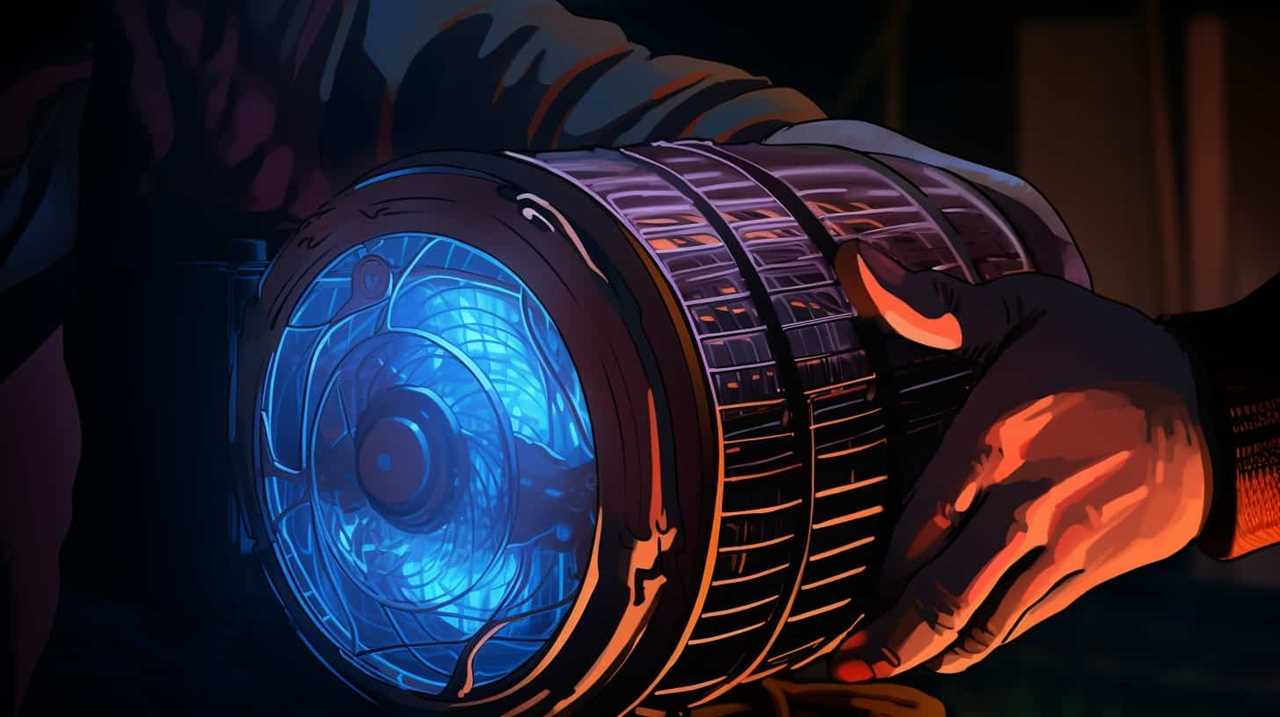
How Does the Efficiency of a Heat Pump Compare to Other HVAC Systems?
The efficiency of a heat pump compared to other HVAC systems is remarkable. It allows for significant energy savings, making it an excellent choice for both heating and cooling.
What Is the Average Lifespan of a Heat Pump?
The average lifespan of a heat pump varies depending on factors such as maintenance requirements. Regular maintenance can help extend the lifespan of a heat pump, ensuring optimal performance and efficiency.
Are There Any Government Incentives or Rebates Available for Purchasing a Heat Pump?
Yes, there are government incentives and rebates available for purchasing a heat pump. These programs can help offset the cost and make it more affordable for homeowners to invest in energy-efficient heating and cooling solutions.
Can a Heat Pump Be Used in Extreme Climates With Very Cold Temperatures?
Yes, a heat pump can be used in extreme climates with very cold temperatures. However, it’s important to consider heat pump sizing and regular heat pump maintenance to ensure optimal performance in these conditions.
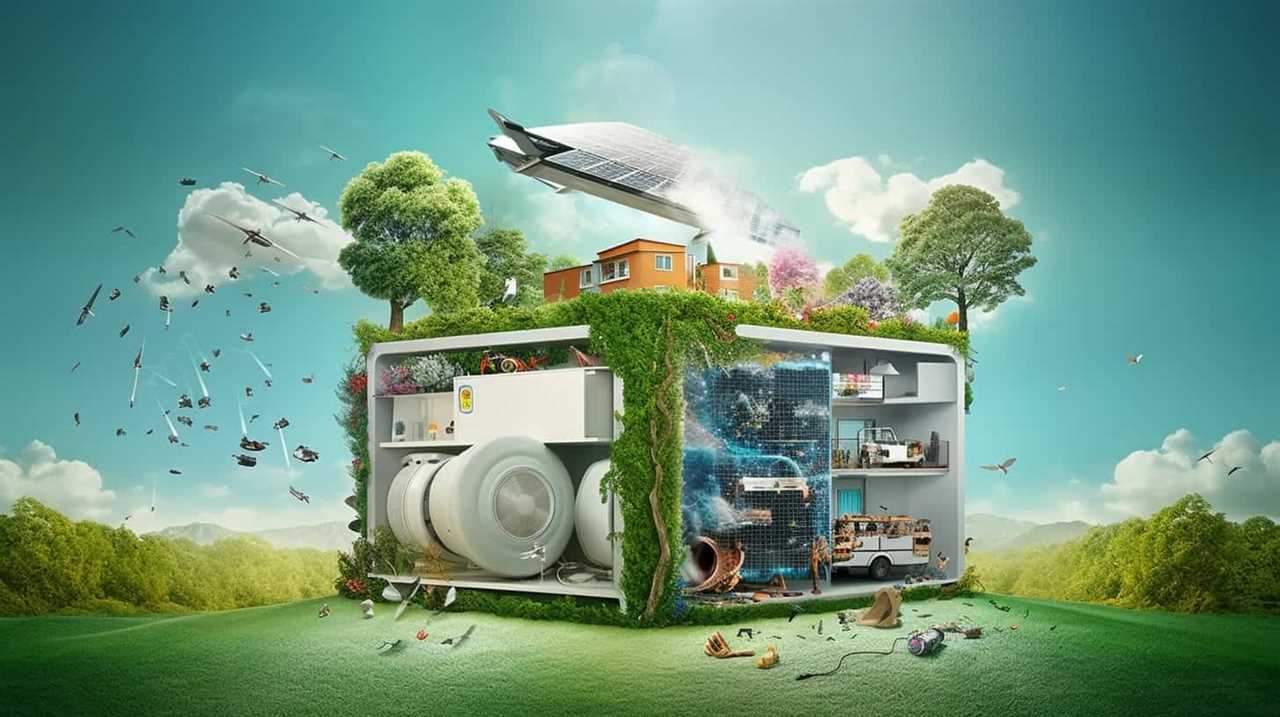
Conclusion
In conclusion, understanding the intricacies of the heat pump refrigeration cycle is crucial for efficient operation.
By comprehending the role of refrigerants, the processes of evaporation and condensation, and the importance of heat transfer and insulation, users can maximize energy efficiency.
For example, proper insulation can significantly reduce heat loss and improve overall performance.
By troubleshooting common issues and implementing energy-saving techniques, heat pump systems can provide reliable heating and cooling while minimizing energy consumption.
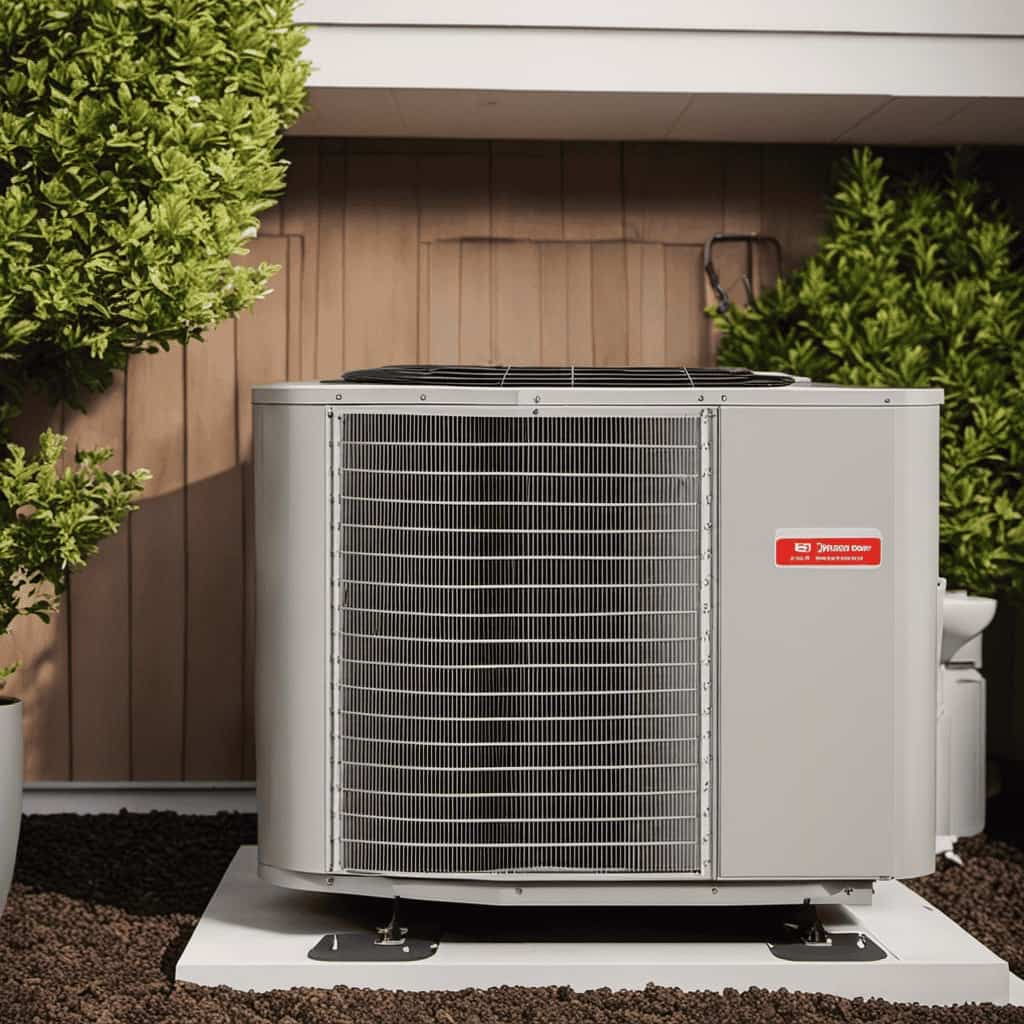
Refrigeration Cycle
High-Efficiency HVAC Systems: Heat Pump Breakthroughs Revealed
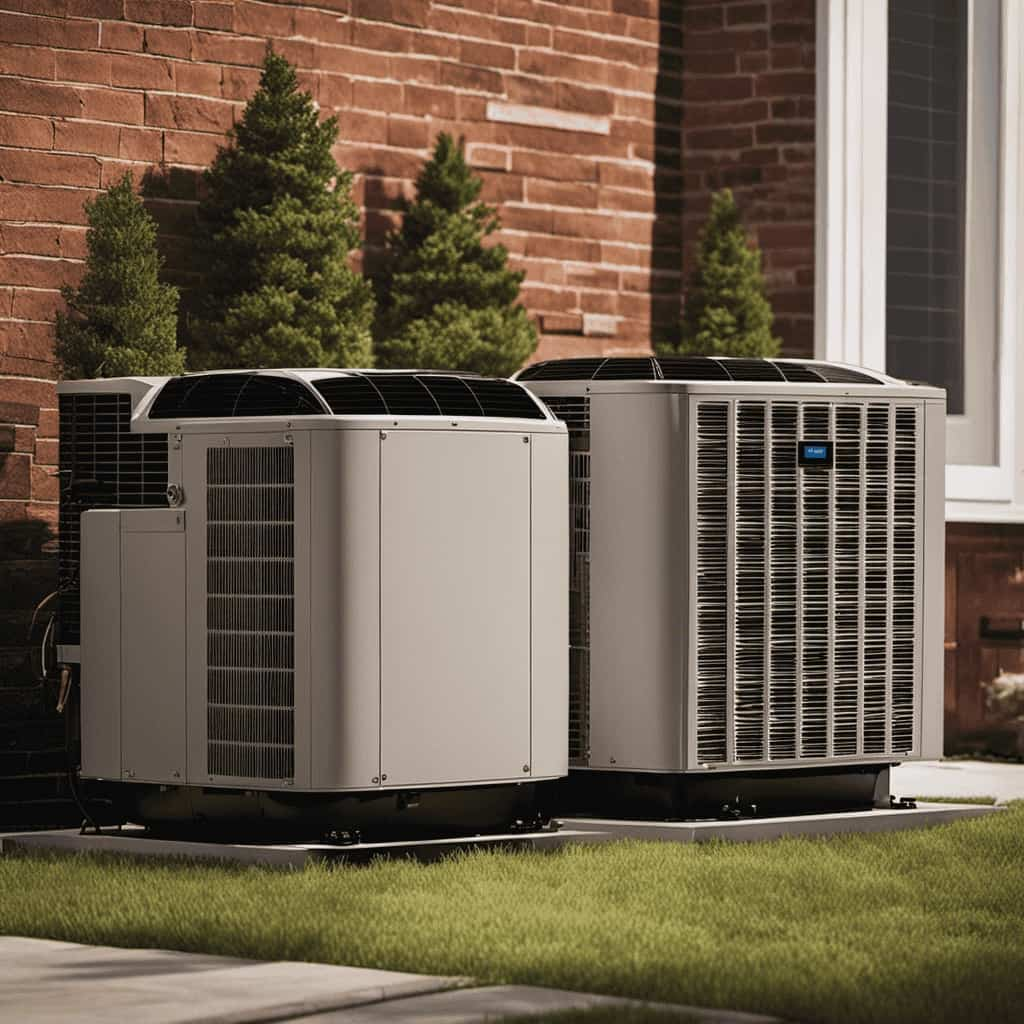
We are excited to announce the newest advancements in high-efficiency HVAC systems.
Picture this: heat pumps that revolutionize energy efficiency, like a cool breeze on a scorching summer day.
In this article, we will delve into the world of heat pump technology, uncovering the key factors that contribute to their efficiency.
Stay tuned as we explore the cutting-edge innovations that make upgrading to a high-efficiency HVAC system a game-changer for your home.
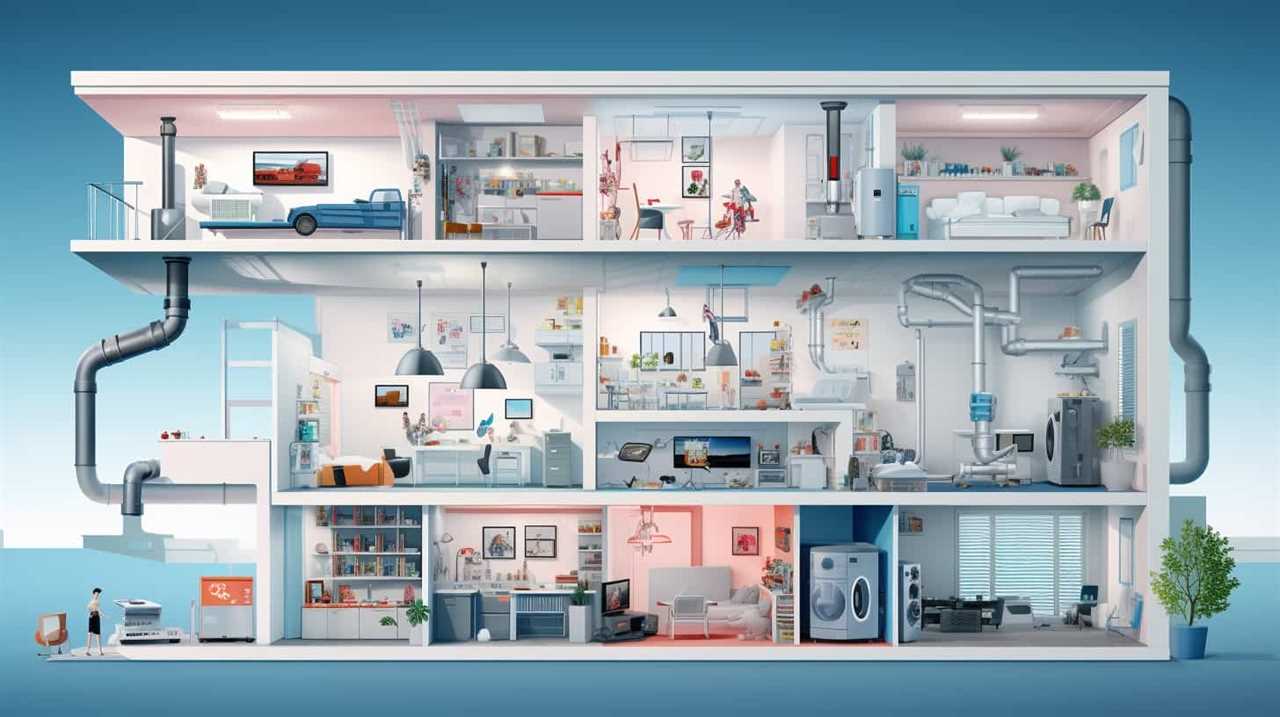
Get ready to liberate your energy consumption!
Key Takeaways
- High-efficiency HVAC systems optimize energy usage and provide superior comfort.
- Regular maintenance, such as cleaning air filters and inspecting ductwork, ensures optimal performance.
- Upgrading to a high-efficiency HVAC system provides optimal comfort while reducing energy consumption and costs.
- The integration of advanced technologies in high-efficiency HVAC systems enhances overall performance and user experience.
Overview of High-Efficiency HVAC Systems
As we delve into the topic of high-efficiency HVAC systems, let’s start by providing an overview of these innovative heating, ventilation, and air conditioning systems.
High-efficiency HVAC systems are designed to optimize energy usage and provide superior comfort in residential and commercial spaces.
One key aspect of maintaining these systems is regular HVAC system maintenance. This includes cleaning or replacing air filters, checking and sealing ductwork, and inspecting and cleaning the outdoor unit.

By properly maintaining your HVAC system, you can ensure its optimal performance and longevity.
Additionally, implementing energy-saving tips can further enhance the efficiency of these systems. Simple steps such as adjusting the thermostat, sealing air leaks, and using ceiling fans can significantly reduce energy consumption and lower utility bills.
Understanding Heat Pump Technology
Let’s dive into the inner workings of heat pump technology and understand how it functions to efficiently heat and cool your space.
Heat pump operation relies on two essential heat transfer mechanisms:
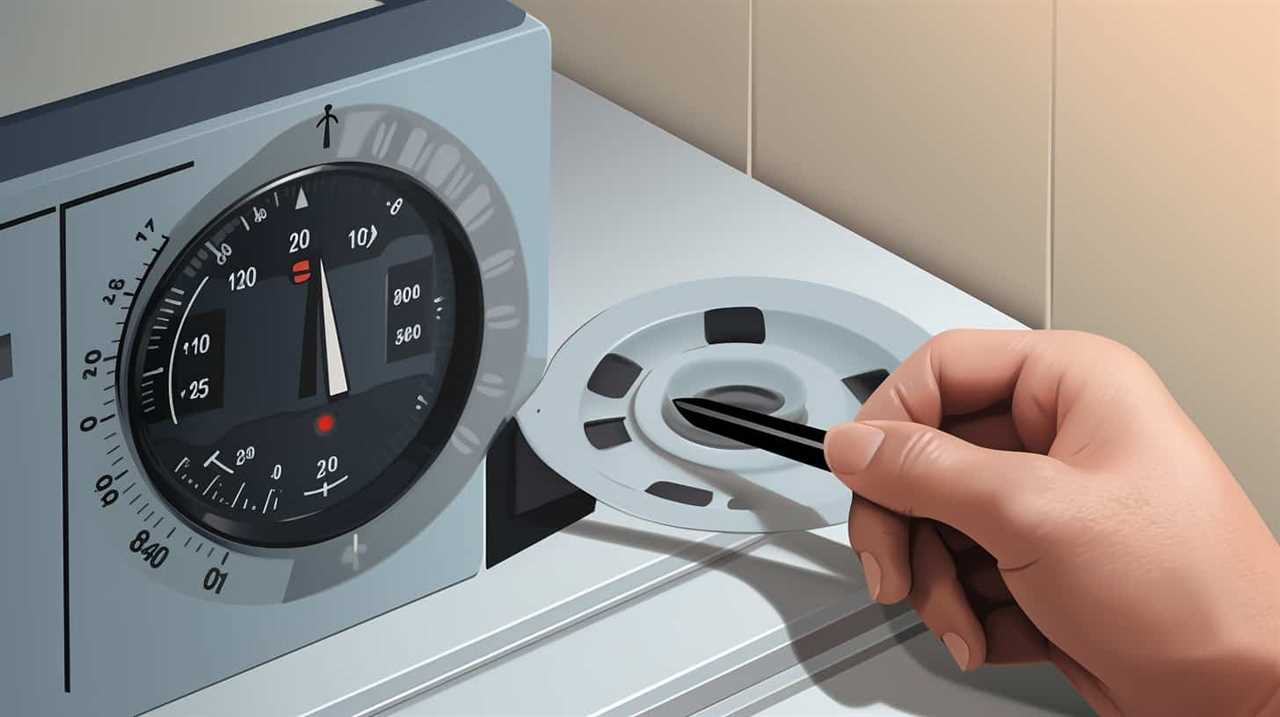
-
Refrigerant: Heat pumps utilize a refrigerant, a substance that can change from a gas to a liquid and vice versa at low temperatures. This refrigerant is responsible for absorbing and releasing heat energy throughout the system.
-
Evaporation and Condensation: The refrigerant evaporates at a low temperature, absorbing heat from the surrounding air or ground. It then undergoes compression, raising its temperature and pressure. Next, it condenses, releasing the absorbed heat to the space being heated.
-
Reversing Valve: The heat pump can change the direction of refrigerant flow using a reversing valve, allowing it to switch between heating and cooling modes.
-
Compressor: The compressor is responsible for increasing the pressure and temperature of the refrigerant, ensuring efficient heat transfer.

-
Heat Exchanger: Heat pumps have two heat exchangers, one indoor and one outdoor. These devices facilitate the transfer of heat between the refrigerant and the air or ground.
Key Factors for Heat Pump Energy Efficiency
We can achieve optimal heat pump energy efficiency by considering key factors such as proper sizing, regular maintenance, and effective insulation.
Heat pump maintenance is crucial for ensuring its peak performance and longevity. Regularly cleaning or replacing air filters is a simple yet effective way to improve energy efficiency. Additionally, scheduling professional maintenance checks at least once a year can help identify and address any potential issues before they become major problems.
Another important factor is effective insulation. Properly insulating your home can prevent heat loss during winter and heat gain during summer, reducing the workload on your heat pump and saving energy.
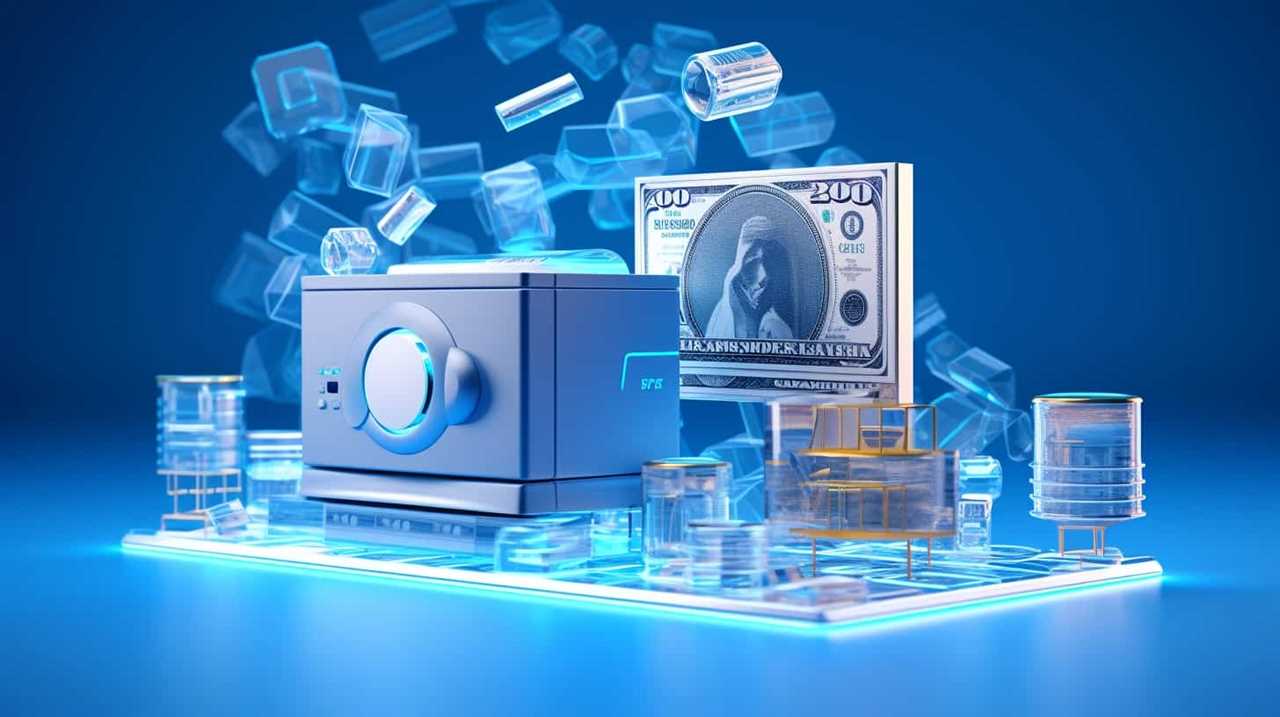
Latest Innovations in High-Efficiency Heat Pumps
Our research has uncovered several exciting breakthroughs in high-efficiency heat pumps that are revolutionizing the HVAC industry. These innovations are driving energy efficiency and providing greater comfort and control for consumers.
Here are five key advancements in high-efficiency heat pumps:
-
Advancements in heat pump compressors: New compressor designs, such as variable speed and scroll compressors, are improving the overall efficiency of heat pumps by allowing them to adjust their output based on the heating and cooling demands.
-
Integration of smart technology: High-efficiency heat pumps now come equipped with smart features that enable users to control and monitor their HVAC systems remotely. This integration allows for optimized energy usage and personalized comfort settings.

-
Enhanced refrigerant technology: The development of new refrigerants with lower global warming potential (GWP) has significantly reduced the environmental impact of high-efficiency heat pumps.
-
Improved defrosting capabilities: Heat pumps now have advanced defrosting algorithms that optimize defrost cycles, reducing energy waste and improving system performance in cold climates.
-
Enhanced system diagnostics: High-efficiency heat pumps are equipped with advanced diagnostic tools that can detect and troubleshoot system issues, allowing for faster and more accurate repairs.
These innovations in high-efficiency heat pumps are making HVAC systems more efficient, reliable, and user-friendly, leading to energy savings and improved comfort for consumers.
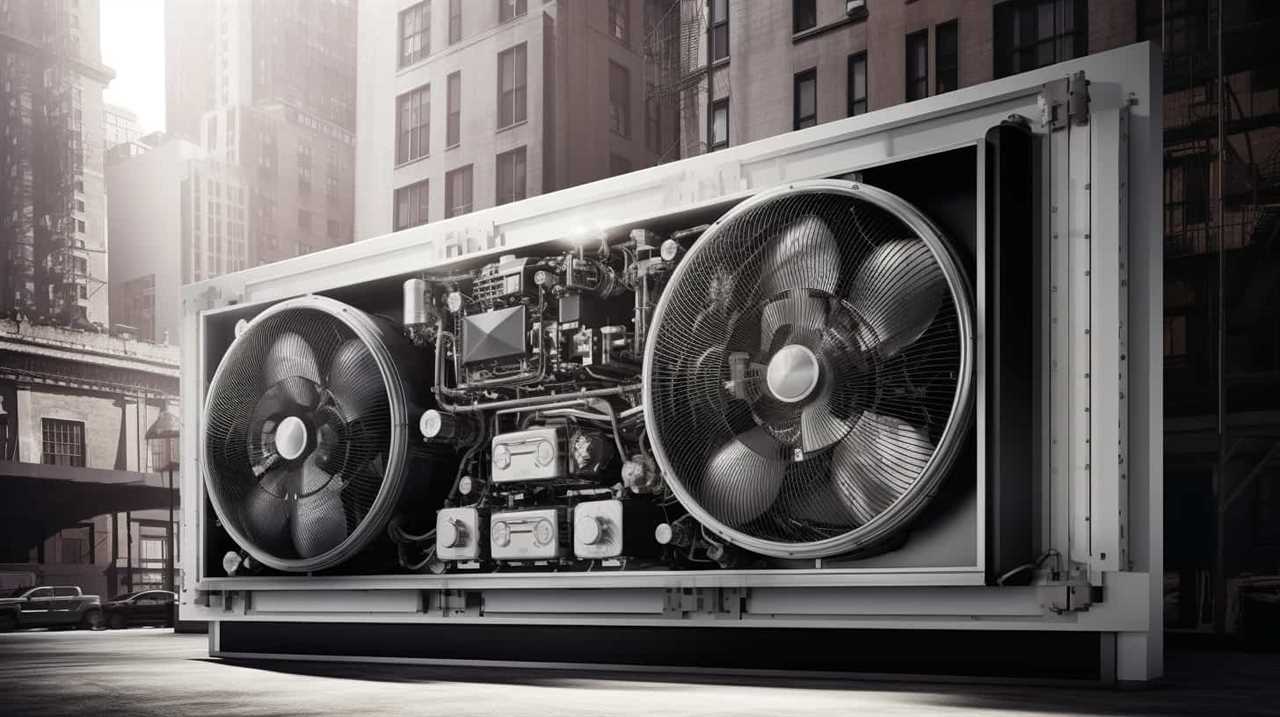
Benefits of Upgrading to a High-Efficiency HVAC System
Upgrading to a high-efficiency HVAC system offers homeowners significant energy savings and improved indoor comfort. These systems are designed to operate more efficiently, resulting in lower energy consumption and reduced utility bills. By utilizing advanced technologies such as variable-speed motors and smart thermostats, high-efficiency HVAC systems can adapt to the specific needs of a home, providing precise temperature control and optimal energy usage. The environmental impact of upgrading to a high-efficiency system should also be considered. These systems consume less energy, which reduces greenhouse gas emissions and helps conserve natural resources. Additionally, some high-efficiency HVAC systems use eco-friendly refrigerants that have a lower impact on the ozone layer. Overall, upgrading to a high-efficiency HVAC system not only benefits homeowners financially but also contributes to a greener and more sustainable future.
| Benefits | Energy Savings | Environmental Impact |
|---|---|---|
| Lower utility bills | Reduced energy consumption | Reduced greenhouse gas emissions |
| Improved comfort | Precise temperature control | Conservation of natural resources |
| Advanced technologies | Optimal energy usage | Use of eco-friendly refrigerants |
Frequently Asked Questions
Are High-Efficiency HVAC Systems More Expensive to Install Than Traditional Systems?
High efficiency HVAC system installation costs can be higher than traditional systems initially, but in the long run, they can save money due to lower energy consumption. Additionally, high efficiency systems tend to have a longer lifespan.
Can a High-Efficiency Heat Pump Be Used in Both Heating and Cooling Modes?
Yes, a high-efficiency heat pump can be used in both heating and cooling modes. It offers energy efficiency benefits and reduces the environmental impact. This breakthrough technology is a game-changer for HVAC systems.
How Long Does It Typically Take for a High-Efficiency HVAC System to Pay for Itself Through Energy Savings?
Typically, the payback period for a high-efficiency HVAC system through energy savings varies. It depends on factors such as the initial cost, energy prices, and usage patterns. However, over time, these systems can help recoup their cost through lower energy bills.
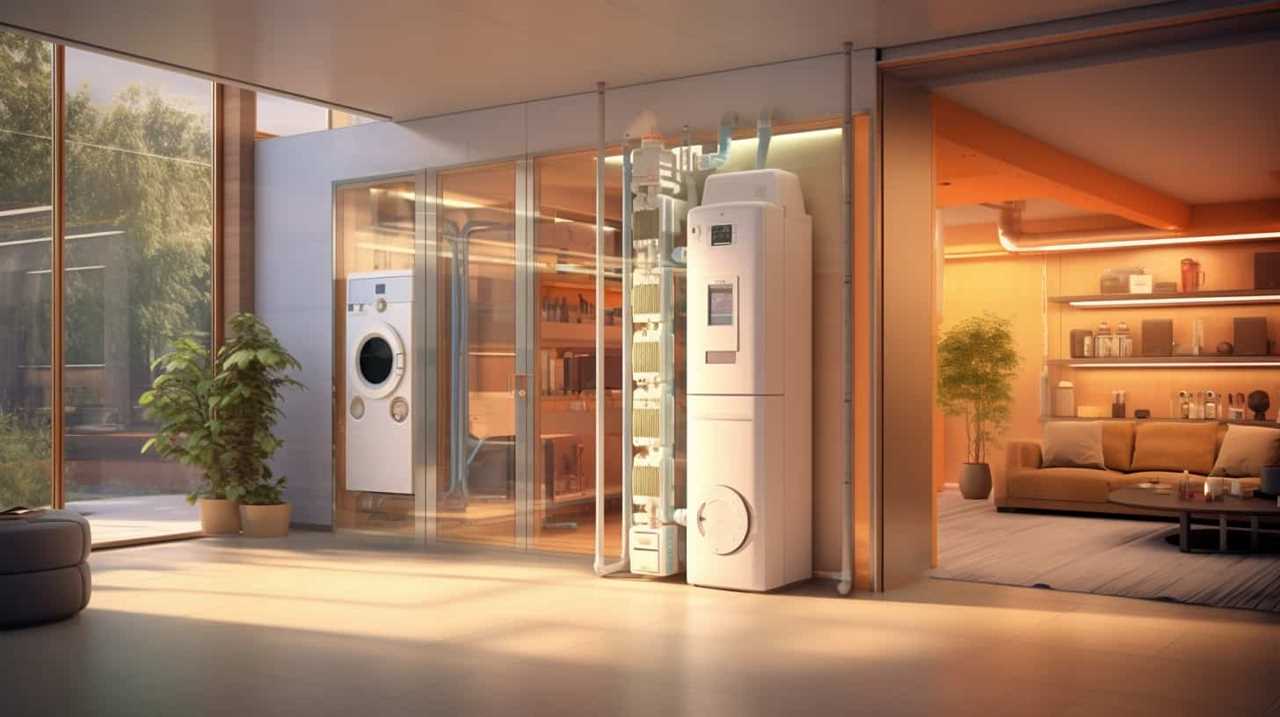
Are There Any Government Incentives or Tax Credits Available for Upgrading to a High-Efficiency HVAC System?
Yes, there are government incentives and tax credits available for upgrading to a high-efficiency HVAC system. These incentives and credits can help offset the cost of installation and make the upgrade more affordable.
Can a High-Efficiency Heat Pump Be Used in Conjunction With a Traditional Furnace for Backup Heating During Extremely Cold Temperatures?
Yes, a high-efficiency heat pump can be used in conjunction with a traditional furnace for backup heating during extremely cold temperatures. This provides the advantages of geothermal heating and the reliability of a traditional furnace.
Conclusion
In conclusion, upgrading to a high-efficiency HVAC system with the latest innovations in heat pump technology can greatly improve energy efficiency and reduce utility costs. These breakthroughs in heat pump technology allow for better heat transfer and more precise temperature control, resulting in optimal comfort and savings.
So, why not take the leap and embrace the new era of high-efficiency HVAC systems? It’s time to reap the benefits and make your home a haven of efficiency and comfort. After all, ‘out with the old, in with the new’!

Refrigeration Cycle
3 Key Comparisons: Heat Pumps Vs Traditional Heating

Welcome, ladies and gentlemen, to our evaluation comparing heat pumps with traditional heating systems.
Today, we embark on a journey where facts will illuminate the path towards informed decision making. Join us as we delve into the realm of energy efficiency, cost effectiveness, and environmental impact.
With these key comparisons, we aim to shed light on the benefits and drawbacks of each option, empowering you to make a choice that aligns with your values and desires for a greener future.
Let’s begin.
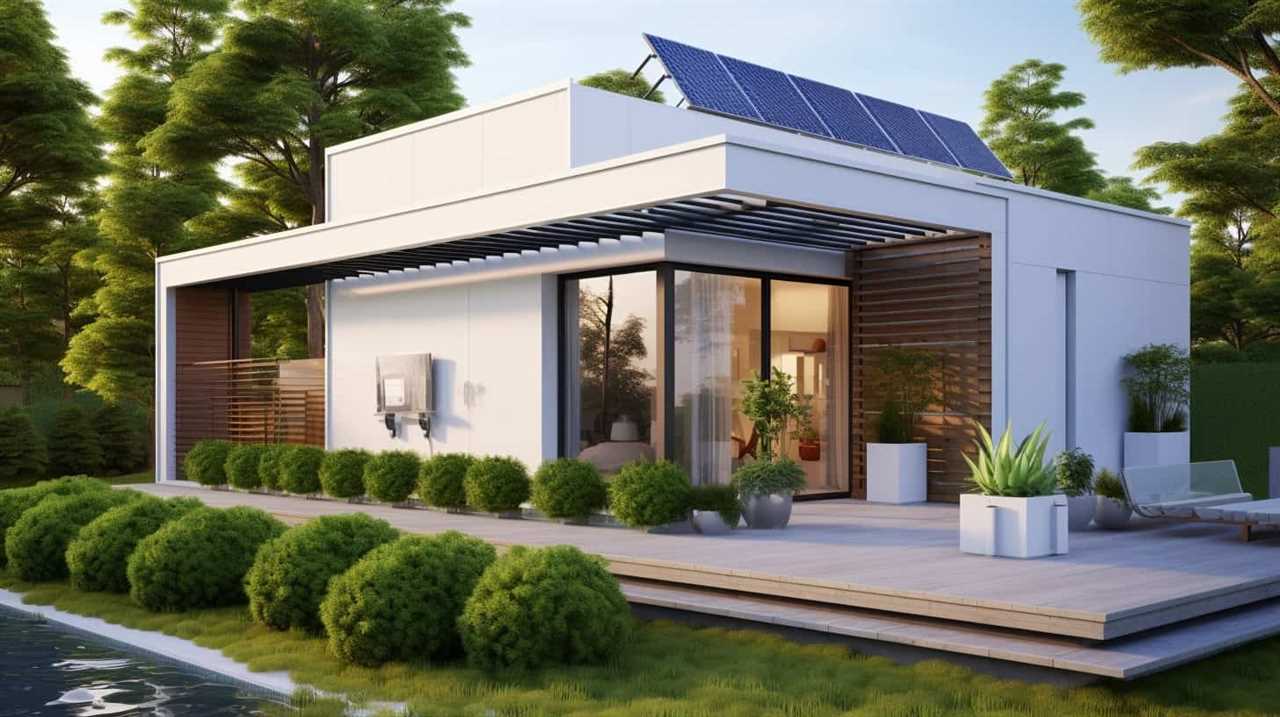
Key Takeaways
- Heat pumps are more energy efficient than traditional heating systems.
- Heat pumps reduce carbon emissions and contribute to a greener future.
- Heat pumps provide efficient and effective heating and cooling solutions.
- Heat pumps can be powered by renewable energy sources.
Energy Efficiency Comparison
When comparing heat pumps to traditional heating systems, we find that heat pumps are more energy efficient. Heat pump technology utilizes the principles of refrigeration to transfer heat from one space to another.
Unlike traditional heating systems that generate heat by burning fuel, heat pumps extract heat from the air, ground, or water sources, making them more energy efficient. This energy efficiency leads to significant energy savings for homeowners and businesses.
Heat pumps can provide up to four times the amount of energy they consume, resulting in lower energy bills and reduced carbon emissions. By harnessing the natural heat available in the environment, heat pump technology offers a sustainable and cost-effective solution for heating and cooling needs.
Cost Comparison
In terms of cost, heat pumps offer a more budget-friendly option compared to traditional heating systems. One of the main advantages of heat pumps is their long-term savings potential. While the initial installation cost of a heat pump may be higher than that of a traditional heating system, the energy savings over time can offset this initial investment.

Heat pumps are highly energy efficient, as they transfer heat rather than generate it, resulting in lower energy consumption and reduced utility bills. Additionally, heat pumps require less maintenance compared to traditional heating systems, resulting in lower maintenance expenses over time. This further contributes to the cost-effectiveness of heat pumps.
Environmental Impact Comparison
Using heat pumps instead of traditional heating systems can significantly reduce our environmental impact while still providing efficient and effective heating.
The environmental benefits of heat pumps are evident when considering carbon footprint analysis and the integration of renewable energy.
-
Carbon footprint analysis:

-
Heat pumps utilize electricity to transfer heat, resulting in lower carbon emissions compared to fossil fuel-based heating systems.
-
Traditional heating systems, such as gas or oil furnaces, release greenhouse gases that contribute to climate change.
-
By choosing heat pumps, we can reduce our carbon footprint and help mitigate the effects of global warming.
-
Renewable energy integration:

-
Heat pumps can be powered by renewable energy sources like solar or wind power.
-
This integration promotes the use of clean and sustainable energy, reducing our reliance on fossil fuels.
-
By harnessing renewable energy for heat pumps, we can further minimize our environmental impact and contribute to a greener future.
Frequently Asked Questions
How Does the Installation Process of a Heat Pump Compare to That of a Traditional Heating System?
The installation process of a heat pump compared to that of a traditional heating system is more complex and requires professional expertise. However, once installed, heat pumps have lower maintenance requirements and provide greater energy efficiency.

Are There Any Specific Maintenance Requirements for Heat Pumps That Differ From Traditional Heating Systems?
When it comes to maintenance requirements, heat pumps differ from traditional heating systems. While the installation process may be similar, heat pumps require regular cleaning of filters and coils, as well as periodic inspections for optimal performance.
Can a Heat Pump Be Used in Conjunction With a Traditional Heating System to Maximize Efficiency?
Yes, a heat pump can be used in conjunction with a traditional heating system to maximize efficiency. By utilizing the heat pump’s efficiency and the traditional system’s capabilities, we can achieve optimal heating performance.
What Are the Noise Levels Typically Associated With Heat Pumps Compared to Traditional Heating Systems?
What are the noise levels typically associated with heat pumps compared to traditional heating systems? Are heat pumps quieter? Noise levels vary, but heat pumps generally operate at lower decibel levels, making them a quieter option for energy-efficient heating.
Are There Any Government Incentives or Tax Credits Available for Installing a Heat Pump Versus a Traditional Heating System?
There are government incentives and tax credits available for installing a heat pump compared to a traditional heating system. These incentives can help offset the cost and make it more affordable for homeowners.
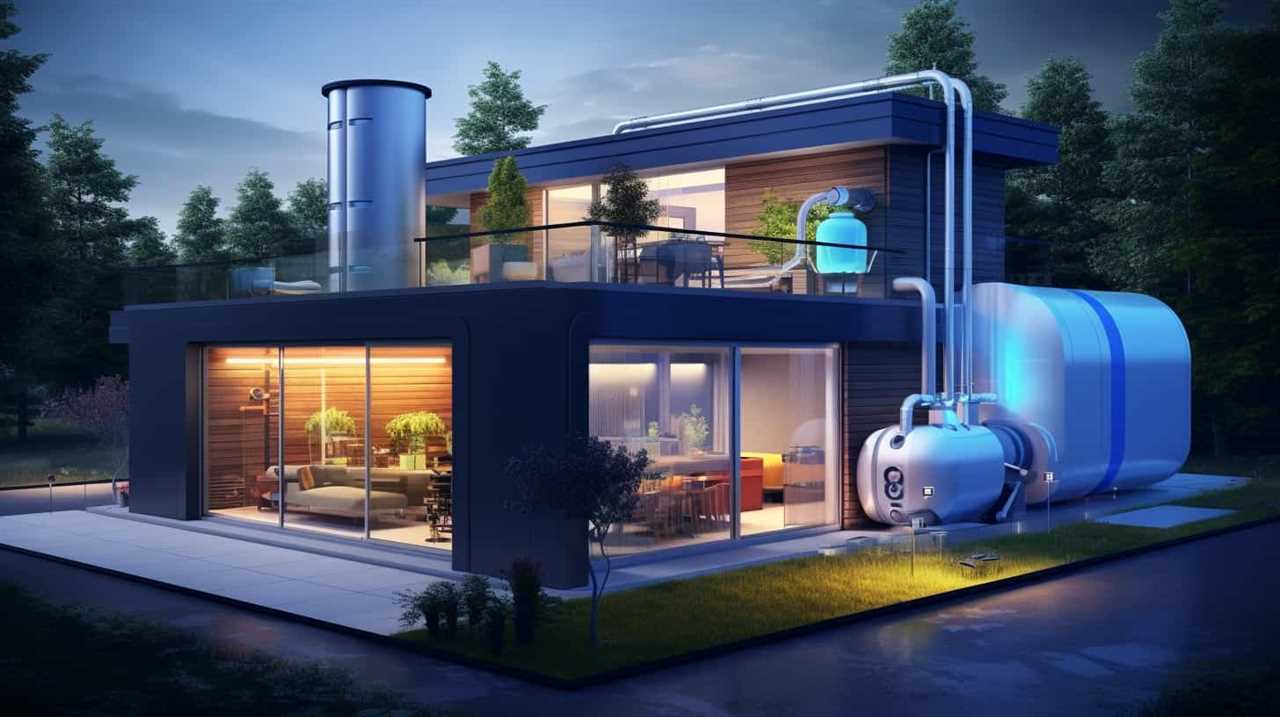
Conclusion
Overall, when comparing heat pumps to traditional heating methods, it’s clear that heat pumps offer significant advantages.
With their higher energy efficiency, cost-effectiveness, and minimal environmental impact, heat pumps paint a picture of a greener and more sustainable future.
By harnessing the power of technology, we can transition away from outdated and inefficient heating systems, symbolizing a shift towards a cleaner and more efficient way of living.
Refrigeration Cycle
Boosting ROI: Energy-Efficient Heat Pumps Expense Analysis

Ladies and gentlemen, get ready as we explore the realm of energy-saving heat pumps and how they affect return on investment (ROI).
In this article, we’ll explore the factors that affect the cost-benefit analysis of heat pump efficiency and analyze the initial expenses involved.
But wait, there’s more! We’ll also calculate the long-term savings these pumps offer and reveal how to maximize ROI through upgrades.
Get ready to revolutionize your energy usage and boost your bottom line!
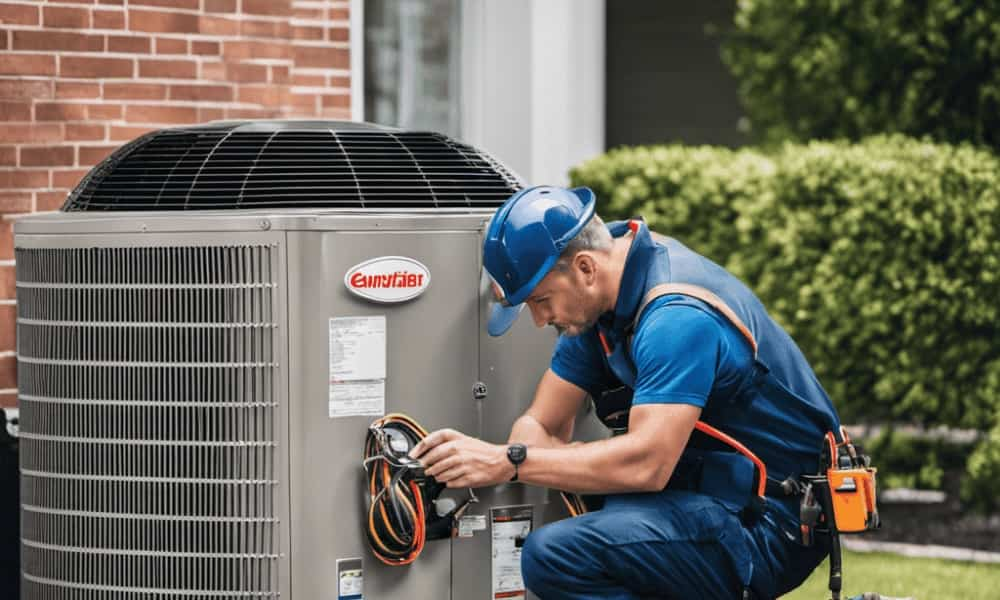
Key Takeaways
- ROI is crucial in determining the value of energy-efficient heat pumps.
- Factors such as energy prices and environmental impact should be considered in the cost-benefit analysis.
- Upfront expenses, maintenance costs, and incentives should be factored in when analyzing the initial expenses.
- Energy-efficient heat pumps can lead to long-term savings through reduced energy consumption and lower utility bills.
The Importance of ROI in Energy-Efficient Heat Pumps
We believe that ROI plays a crucial role in determining the value of energy-efficient heat pumps. For businesses and homeowners alike, it’s essential to consider the financial return on investment when deciding to adopt these innovative solutions.
The importance of ROI becomes even more evident when considering the impact on the environment. Energy-efficient heat pumps not only reduce energy consumption and utility costs but also significantly lower carbon footprint.
This is where government incentives come into play. By providing financial support and incentives for the adoption of energy-efficient heat pumps, governments can encourage individuals and organizations to invest in these environmentally friendly technologies. This not only benefits the environment but also helps businesses and homeowners save money in the long run.
Therefore, understanding the importance of ROI in energy-efficient heat pumps is crucial for making informed decisions and driving innovation in sustainable energy solutions.

Factors Affecting the Cost-Benefit Analysis of Heat Pump Efficiency
When evaluating the cost-benefit analysis of heat pump efficiency, it’s important to consider various factors that can impact the overall financial return on investment. Two key factors that must be taken into account are energy prices and the environmental impact of the heat pump system.
Energy prices play a significant role in determining the cost savings associated with heat pump efficiency. Higher energy prices can result in greater cost savings over time, as the energy-efficient heat pump consumes less electricity compared to traditional heating and cooling systems. On the other hand, lower energy prices may reduce the financial benefits of investing in a heat pump.
Furthermore, the environmental impact of the heat pump system is another important consideration. Heat pumps are known for their lower carbon emissions compared to conventional heating and cooling systems. By reducing reliance on fossil fuels, heat pumps contribute to a greener and more sustainable future. This environmental benefit must be factored into the cost-benefit analysis, as it adds value to the overall return on investment.
Analyzing the Initial Expenses of Energy-Efficient Heat Pumps
To accurately assess the financial viability of energy-efficient heat pumps, it’s essential to analyze the initial expenses involved and their impact on the return on investment. When conducting a cost analysis of energy-efficient heat pumps, the following factors should be considered:

-
Initial Investment: The upfront cost of purchasing and installing an energy-efficient heat pump is a significant expense. It includes the cost of the unit itself, any necessary modifications to the existing HVAC system, and professional installation fees.
-
Energy Savings: Energy-efficient heat pumps consume less electricity compared to traditional heating systems. By quantifying the potential energy savings over the lifespan of the heat pump, the long-term financial benefits can be determined.
-
Maintenance and Repair Costs: It’s important to factor in the ongoing maintenance and repair costs associated with energy-efficient heat pumps. Regular maintenance and occasional repairs are necessary to ensure optimal performance and longevity.
-
Incentives and Rebates: Various government incentives and utility company rebates may be available to offset the initial investment. These incentives can significantly reduce the overall cost and improve the return on investment.

Calculating Long-Term Savings With Energy-Efficient Heat Pumps
Our analysis aims to determine the long-term savings achieved by utilizing energy-efficient heat pumps. When considering the cost of implementing energy-efficient heat pumps, it’s essential to assess the long-term benefits and energy savings that can be achieved.
Energy-efficient heat pumps have the potential to significantly reduce energy consumption and lower utility bills. By utilizing advanced technology and innovative designs, these heat pumps can provide efficient heating and cooling solutions while minimizing energy wastage.
The long-term benefits of energy-efficient heat pumps include reduced energy costs, improved energy efficiency, and decreased environmental impact. These factors contribute to substantial savings over time, making energy-efficient heat pumps a wise investment for both residential and commercial applications.
Maximizing ROI Through Energy-Efficient Heat Pump Upgrades
The key to maximizing our ROI through energy-efficient heat pump upgrades lies in carefully selecting the most cost-effective and technologically advanced options available. By improving efficiency and taking advantage of financial benefits, we can significantly increase our returns on investment.

Here are four strategies to consider when upgrading heat pumps:
-
Conduct a thorough energy audit: Before making any upgrades, assess the current energy usage and identify areas for improvement. This will help determine the most effective upgrades to maximize ROI.
-
Choose high-efficiency heat pumps: Look for heat pumps that have a high SEER (Seasonal Energy Efficiency Ratio) rating and HSPF (Heating Seasonal Performance Factor) rating. These ratings indicate the energy efficiency of the heat pump and can greatly impact energy savings.
-
Consider variable-speed technology: Heat pumps with variable-speed compressors adjust their output based on the heating or cooling needs, resulting in more efficient operation and reduced energy consumption.
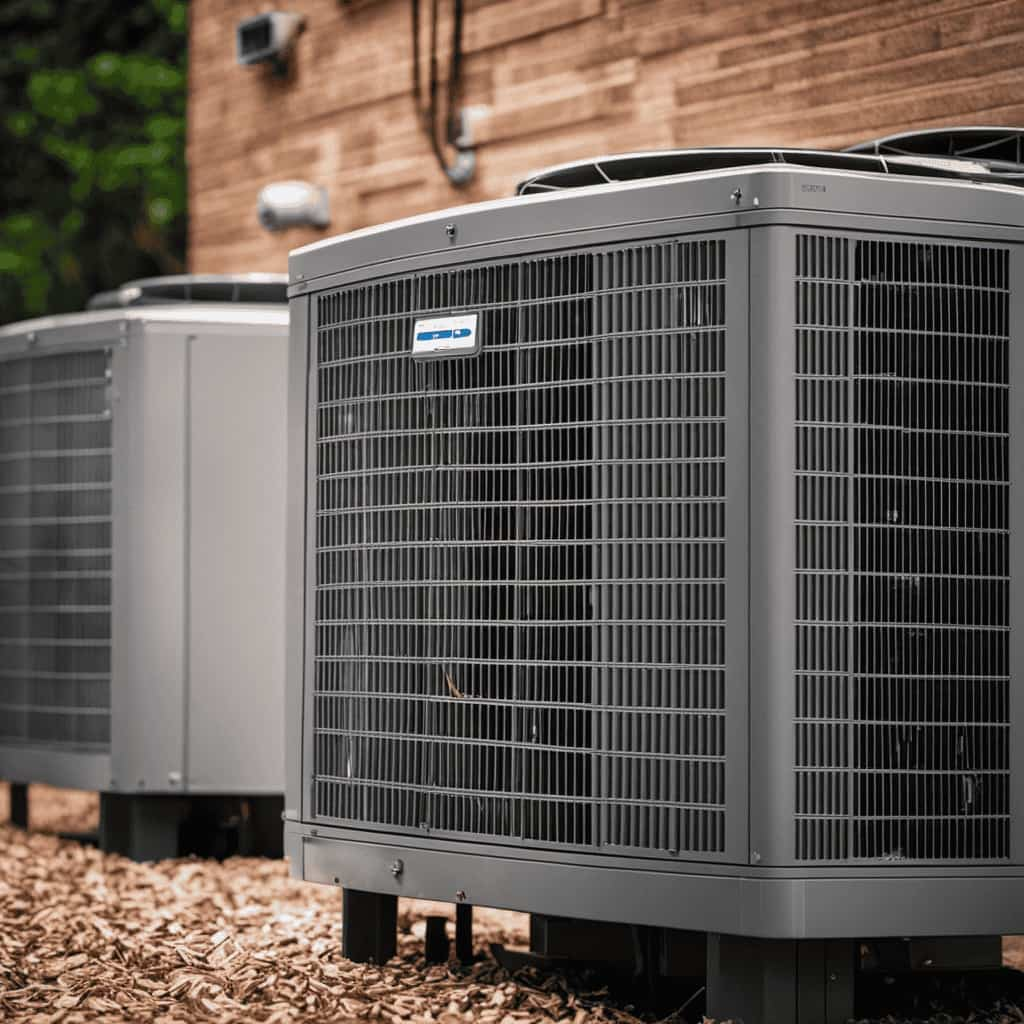
-
Explore financing options: Research available incentives, rebates, and financing programs to offset the initial cost of the upgrades. This can help improve the ROI and make the investment more financially feasible.
Frequently Asked Questions
How Do Heat Pumps Compare to Other Heating and Cooling Systems in Terms of Energy Efficiency?
Heat pumps offer higher energy efficiency compared to other heating and cooling systems. A comparative analysis reveals their lower environmental impact. This innovation provides a technical and analytical solution for boosting ROI and reducing energy expenses.
What Are the Key Factors to Consider When Analyzing the Long-Term Savings of Energy-Efficient Heat Pumps?
When analyzing the long-term savings of energy-efficient heat pumps, key factors to consider include energy savings and maintenance costs. By examining these factors, we can determine the overall return on investment for this innovative technology.
Are There Any Government Incentives or Rebates Available for Installing Energy-Efficient Heat Pumps?
Yes, there are government incentives and rebates available for installing energy-efficient heat pumps. These incentives aim to promote energy savings and make the adoption of such technology more financially feasible for consumers.

How Does the Climate or Geographical Location Affect the Cost-Benefit Analysis of Heat Pump Efficiency?
The climate and geographical location have a significant impact on the cost-benefit analysis of heat pump efficiency. Understanding these factors is crucial when evaluating the potential ROI and determining the most suitable energy-efficient heat pump system.
What Are Some Common Upgrades or Improvements That Can Be Made to Existing Heat Pump Systems to Maximize Roi?
Improving performance and maximizing ROI for existing heat pump systems can be achieved through various retrofit options. Upgrades such as variable speed drives, enhanced controls, and improved insulation can significantly enhance efficiency and reduce operating costs.
Conclusion
In conclusion, by considering the importance of ROI in energy-efficient heat pumps and analyzing the initial expenses as well as long-term savings, it’s evident that maximizing ROI through upgrades is crucial.
Factors affecting the cost-benefit analysis of heat pump efficiency should be taken into account to make informed decisions.

By implementing energy-efficient heat pumps, individuals can enjoy the benefits of reduced energy consumption and increased cost savings.
-

 Residential and Commercial Applications2 weeks ago
Residential and Commercial Applications2 weeks agoBest Amana Heat Pump Reviews
-

 Thermal Energy Transfer2 weeks ago
Thermal Energy Transfer2 weeks agoBreakthroughs in Modern Heat Pump Systems: Thermal Energy Edition
-

 Residential and Commercial Applications2 weeks ago
Residential and Commercial Applications2 weeks agoBest Heat Pump
-

 Geothermal Heat Pumps3 months ago
Geothermal Heat Pumps3 months agoUpgrade Your Comfort with Our Efficient HVAC Systems
-

 Air Conditioning3 months ago
Air Conditioning3 months agoExploring Energy-Efficient Air Conditioning Heat Pumps
-

 Geothermal Heat Pumps3 months ago
Geothermal Heat Pumps3 months agoInnovative Geothermal Heat Pump Manufacturers Revolutionize Energy Efficiency
-

 Thermal Energy Transfer1 month ago
Thermal Energy Transfer1 month agoBoost Your Heat Pump Efficiency: Interactive Guide
-

 Residential and Commercial Applications2 weeks ago
Residential and Commercial Applications2 weeks agoBest Portable Heat Pump Heat & AC










